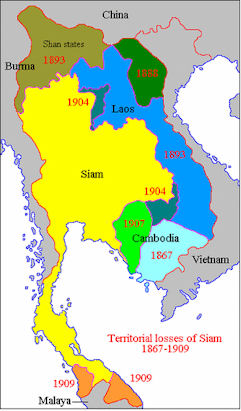

Zitierweise / cite as:
Payer, Alois <1944 - >: Chronik Thailands = กาลานุกรมสยามประเทศไทย. -- Chronik 1894 (Rama V.). -- Fassung vom 2017-02-08. -- URL: http://www.payer.de/thailandchronik/chronik1894.htm
Erstmals publiziert: 2013-10-01
Überarbeitungen: 2017-02-08 [Ergänzungen] ; 2017-01-28 [Ergänzungen] ; 2017-01-18 [Ergänzungen] ; 2016-12-03 [Ergänzungen] ; 2016-11-02 [Ergänzungen] ; 2016-09-06 [Ergänzungen] ; 2016-02-26 [Ergänzungen] ; 2015-10-05 [Ergänzungen] ; 2015-09-14 [Ergänzungen] ; 2015-06-23 [Ergänzungen] ; 2015-06-08 [Ergänzungen] ; 2015-05-11 [Ergänzungen] ; 2015-04-29 [Ergänzungen] ; 2015-04-06 [Ergänzungen] ; 2015-03-27 [Ergänzungen] ; 2015-03-16 [Ergänzungen] ; 2015-02-23 [Ergänzungen] ; 2015-01-12 [Ergänzungen] ; 2014-12-28 [Ergänzungen] ; 2014-12-02 [Ergänzungen] ; 2014-11-08 [Ergänzungen] ; 2014-08-12 [Ergänzungen] ; 2014-03-07 [Ergänzungen] ; 2014-02-20 [Ergänzungen] ; 2013-11-26 [Ergänzungen] ; 2013-11-10 [Ergänzungen] ; 2013-10-31 [Ergänzungen] ; 2013-10-06 [Ergänzungen]
©opyright: Dieser Text steht der Allgemeinheit zur Verfügung. Eine Verwertung in Publikationen, die über übliche Zitate hinausgeht, bedarf der ausdrücklichen Genehmigung des Herausgebers.
Dieser Text ist Teil der Abteilung
Thailand von
Tüpfli's Global Village Library
ช้างตายทั้งตัวเอาใบบัวปิดไม่มิด
|
Gewidmet meiner lieben Frau Margarete Payer die seit unserem ersten Besuch in Thailand 1974 mit mir die Liebe zu den und die Sorge um die Bewohner Thailands teilt. |
|
Bei thailändischen Statistiken muss man mit allen Fehlerquellen rechnen, die in folgendem Werk beschrieben sind:
Die Statistikdiagramme geben also meistens eher qualitative als korrekte quantitative Beziehungen wieder.
|
1894 - 1898
Finanzreform in Monthon Phitsanulok [มณฑลพิษณุโลก]
Abb.: Lage von Phitsanulok [พิษณุโลก]
[Bildquelle: OpenStreetMap. -- Creative Commons Lizenz (Namensnennung, share alike)]
"Phraya Sisuriyaratchawaranawat's [พระยาศรีสุริยะราชวรานุวัตร] reform of the common people's service and commutation tax in monthon Phitsanulok [มณฑลพิษณุโลก] illustrates how the superintendent commissioners introduced financial measures with the intention of increasing the government's revenue and weakening the provincial nobility at the same time. In l894, he undermined the provincial nobility's prestige and power by abolishing their right to demand personal service from a number of the common people, and enabled all the common people to pay the standard commutation tax of eighteen baht per year. In the following year, he took over the collection of the commutation tax, and raised the revenue from this source from 27,760 baht to 35.525 baht. In 1896, he began to ruin the provincial nobility's fortune and to finally sever their relationship with the common people, when he abolished their 6% share of the commutation tax, on the grounds that he had already transformed them into salaried civil servants. Phraya Sisuriyaratchawaranawat's ruthless attack on the provincial nobility's finances was highly successful, for he reduced 237 out of 348 noblemen of monthon Phitsanulok to bankruptcy between 1896 and 1898." [Quelle: Tej Bunnag [เตช บุนนาค] <1943 - >: The provincial administration of Siam from 1892 to 1915 : a study off the creation, the growth, the achievements, and the implications for modern Siam, of the ministry of the interior under prince Damrong Rachanuphap. -- Diss. Oxford : St. Anthonys College, Michaelmas Term 1968. -- 429 S., Schreibmaschinenschrift. -- S. 186f. -- Faire use]
1894
Abb.: Uttaradit (อุตรดิตถ์), 1894
Abb.: Lage von Uttaradit (อุตรดิตถ์)
[Bildquelle: CIA. -- Public domain]
1894
Abb.: Angehörige eines Bergvolks, Pai (ปาย), 1894
Abb.: Lage von Pai (ปาย)
[Bildquelle: OpenStreetMap. -- Creative Commons Lizenz (Namensnennung, share alike)]
1894
Staatliche Finanzreserven: 7,5 Mio. Baht.
1894
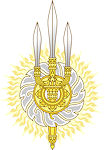
Schaffung eines Legislative Council (Council of Legal Advisers = Council of Ministers). Reform der Provinzialverwaltung.
Abb.: Monthon - มณฑล (verschiedenfarbig), 1915
[Bildquelle: Ahoerstemeier / Wikipedia. -- GNU FDLicense]
Abb.: Vizegouverneur der Provinz Sukhothai (สุโขทัย) mit Untergebenen
Abb.: Lage von Sukhothai (สุโขทัย)
[Bildquelle: OpenStreetMap. -- Creative Commons Lizenz (Namensnennung, share alike)]
"Meanwhile, the new leaven of Western civilisation was producing amongst the ruling classes a desire for a system of government more in harmony with the progressive spirit of the age. Up to 1893 the affairs of the country were administered by a Council of twelve ministers, acting under the direction of the king, who often presided at the Councils. In that year an important innovation was made by the creation of a new body styled a Legislative Council. The ministers were joined, as members of this authority, with a number of persons nominated by the king and six members of the royal family. Power was given to the Council to call in outsiders to give advice, and to bring the new system further into accord with European principles of government it was decreed that the meetings of the body should be held in public. It was a notable step forward on the path of reform that was thus taken. That the change was meant by the king to mark a departure from the old despotic system was shown soon after the appointment of the Council by the promulgation of a decree empowering the authority to introduce and discuss new laws and regulations, and to put into operation any law that it might pass without the authority of the king, provided that his Majesty was not at the time in sufficiently good health to attend to State business. The concession, though qualified by a proviso that all laws and regulations so passed should be subject to revision by the king on his recovery from illness, was a remarkable privilege for an Oriental monarch to grant on his own volition, and it serves perhaps more than any other isolated act to accentuate the extent to which Siam at this period was dominated by the spirit of progress.
In conjunction with the setting up of this quasi-constitutional system there was introduced an important scheme of reform of the provincial administration. To each province was appointed a Royal Commissioner with executive powers. These functionaries, who held office at the wish of the king, are not only responsible for the good government of the districts of which they have charge, but are intended as connecting links between the central and the outlying portions of the kingdom.
"The appointment of the Royal Commissioners," says Mr. Ernest Young, in "The Kingdom of the Yellow Robe," "was very much resented by some of the chiefs, especially by those who had previously reigned with the full title and dignity. Amongst these was the King of Luang Prabang. When the new Commissioners were appointed a very young man was sent to take over the government of this province. On nearing the scene of his new labours he sent word to the old chief to tell him of his arrival, and to demand a formal and elaborate reception to be made for him as a mark of respect to the sovereign whose orders he had come to execute. The old man went himself to meet the new arrival, indulging in a good deal of grumbling on the way, and wondering why there was any necessity to make such a fuss. When he found to what extent he was to be superseded in the government of his ancient domain his grief and anger knew no bounds, but as he was powerless to resent his treatment he had to be content with grumbling and moaning. . . . One day the Commissioner heard the deposed governor addressed by the people with the title of king. He at once forbade the repetition of the word, saying, 'There is but one king in Siam.' The old man smarted not a little under what he considered a new insult, but he restrained any outward expression of his feelings. Not long after this occurrence the Commissioner found that the chief had in his possession a state umbrella with the number of tiers used by royalty. He ordered two of these to be at once removed. This order was obeyed. The insulted chief got his revenge at last when the French took the province of Luang Prabang. M. Pavie, the French Commissioner, and formerly French minister at Bangkok, sent the Siamese representative about his business, and invited the old chief to an interview. When the chief arrived M. Pavie asked him if there was anything he wanted either for himself or his people. The old man related his loss of dignity and title, and begged that he might be allowed to repair his umbrella, and call himself king once more. 'Certainly,' said M. Pavie, with diplomatic condescension, 'call yourself anything you like, and as to the umbrella, add two tiers or twenty, just as you please.' The re-made king was delighted, and returned home exceedingly glad at heart."
[Quelle: Arnold Wright in: Twentieth century impressions of Siam : its history, people, commerce, industries, and resources / ed. in chief: Arnold Wright. -- London [etc.] : Lloyds, 1908. -- S. 70]
"In 1894 the internal administration was reorganised, and the whole of the country placed under the administration of the Ministry of the Interior with the exception of the capital and the surrounding provinces. An Act similar to the British Act applying to Burma has been adopted for the government of the great mass of the people in the provinces of the interior.
Each hamlet [หมู่บ้าน], consisting of about ten houses, has its elected elder. The elders in their turn elect a headman for the village [ตำบล], a village consisting of ten hamlets. The Government appoints an "amphur" [อำเภอ] with petty magisterial powers who has jurisdiction over a group of villages.
"Muangs" [เมือง] or provinces, are each in the charge of a governor, and the governors are in their turn directly responsible to the High Commissioners, who are at the head of the thirteen monthons [มณฑล], or circles, into which the country is divided.
The Commissioners meet once a year at the Ministry of Justice, and, under the presidency of the Minister of the Interior, report upon the work that has been accomplished and discuss the future programme. Gradually this assembly of the High Commissioners is becoming quite an important feature in the government of the country."
[Quelle: Twentieth century impressions of Siam : its history, people, commerce, industries, and resources / ed. in chief: Arnold Wright. -- London [etc.] : Lloyds, 1908. -- S. 91]
1894
Wehrpflichtgesetz; ist Grundlage für modernes Heer Siams.
1894
Abb.: Siamesischer Kavallerist, 1894
1894
Sport-Lied Krao kila (กราวกีฬา) von Erziehungsminister Phya Dharmasakdi (พระยาธรรมศักดิ์, 1876 - 1943).
Abb.: Krao kila (กราวกีฬา) von Phya Dharmasakdi (พระยาธรรมศักดิ์)
พวกเรานักกีฬาใจกล้าหาญ เชี่ยวชาญชิงชัยไม่ย่นย่อ คราวชนะรุกใหญ่ไม่รีรอ คราวแพ้ก็ไม่ท้อกัดฟันทน (สร้อย) อึม อึม อึม อึม กีฬา กีฬา เป็นยาวิเศษ... ฮ้าไฮ้ ฮ้าไฮ้ กีฬา กีฬา เป็นยาวิเศษ
แก้กองกิเลสทำคนให้เป็นคน ผลของการฝึกตน เล่นกีฬาสากล ตะละล้าร่างกายกำยำล้ำเลิศ กล้ามเนื้อก่อเกิดทุกแห่งหน แข็งแรงทรหดอดทน ว่องไวไม่ย่นระย่อใคร (สร้อย) อึม อึม... ใจคอมั่นคงทรงศักดิ์ รู้จักที่หนีที่ไล่ รู้แพ้ รู้ชนะ รู้อภัย ไว้ใจได้ทั่วทั้งรักชัง (สร้อย) อึม อึม... ไม่ชอบเอาเปรียบเทียบแข่งขัน สู้กันซึ่งหน้าอย่าลับหลัง มัวส่วนตัวเบื่อเหลือกำลัง เกลียดชังการเล่นเห็นแก่ตัว (สร้อย) อึม อึม... เล่นรวมกำลังกันทั้งพวก เอาชัยสะดวกมิใช่ชั่ว ไม่ว่างานหรือเล่นเป็นไม่กลัว ร่วมมือกันทั่วก็ไชโยฯ (สร้อย) อึม อึม... [Quelle: http://th.wikipedia.org/wiki/%E0%B8%81%E0%B8%A3%E0%B8%B2%E0%B8%A7%E0%B8%81%E0%B8%B5%E0%B8%AC%E0%B8%B2. -- Zugriff am 2012-03-22]
1894
Die Firma Gim Seng Lee (Jin Cheng Li - 金成利) hält folgende Steuermonopole:
- In Chiang Mai (เชียงใหม่)
- Reis
- Tabak
- Kokosnuss
- Betelnuss
- Schwein
- Rinder
- Opium
- In verschiedenen Städten Nordthailands
- Opium
- Alkohol
- Glücksspiel
1894 - 1897
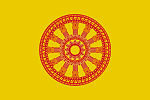
Über 200 Thammayut-Mönche [ธรรมยุติกนิกาย] melden sich zu den schriftlichen Paliprüfungen im Wat Boworn [วัดบวรนิเวศวิหารราชวรวิหาร]
1894 - 1905
Es erscheint die Monatszeitung
วชิรญาณ [Wachirayan]. -- 1894 - 1905
Abb.: Einbandtitel
1894

Aus dem Tagebuch des in Siam tätigen kanadischen Eisenbahningenieurs Henry Gittins (1858 - 1937)
Über seinen Besuch beim Gouverneur Prinz Prachak (พลตรี พระเจ้าบรมวงศ์เธอ กรมหลวงประจักษ์ศิลปาคม, 1856 - 1924) in Udon Thani (อุดรธานี):
"The other side of the river is now French territory but they have no one in charge, so the people have a free hand. No taxation and no laws, which they don’t fail to take advantage of - free spirits, opium, etc., the former costing just one half what it does on this side. Prince Prachak was pleasant and agreeable. He is great on astronomy and very fond of manufacturing a lot of stuff of various kinds from the materials in the country, sealing wax, soap, a very good liquor made from pineapple, butter, cheese and many other things. Altogether, he seems a genius, but rather to my surprise he got talking about religion and said he believed in nothing. The only two things that he knew were true being a straight line and a circle." [Zitiert in: Gittins, Paul <1964 - >: On track : Henry Gittins, railway pioneer in Siam and Canada. -- Bangkok : River, 2014. -- 151 S. : Ill. ; 21 cm. -- ISBN 978-616-7339-42-9. -- S. 55f. -- Fair use]
Über die Bewohner des nördlichen Nordost-Siam:
"The people here are very conservative and strongly object to any innovations. Their invariable answer is that their fathers and grandfathers always did it this way, consequently it’s good enough for them. Suggest the most simple improvement to them and one that they can see and admit would be an advantage, but you get the same shake of the head and ‘my father didn’t do it ’" [Zitiert in: Gittins, Paul <1964 - >: On track : Henry Gittins, railway pioneer in Siam and Canada. -- Bangkok : River, 2014. -- 151 S. : Ill. ; 21 cm. -- ISBN 978-616-7339-42-9. -- S. 57. -- Fair use]
1894

Der Brite Warington Smyth (1867 - 1943) über den Zustand der Telegrafenlinie nach Phang Nga (พังงา):
Abb.: Lage von Phang Nga (พังงา)
[Bildquelle: OpenStreetMap. -- Creative Commons Lizenz (Namensnennung, share alike)]
"We followed the clearing made some years ago by the order of the Siamese Government for the telegraph which was to have connected the whole of the peninsula with Bangkok ... The clearing was made at great expense through all the provinces ... through swamp and forest and posts put up throughout ... the materials were purchased and were taken to the various points and there left. The fatal lack of decision, which has cost Siam so much, intervened once more. The wires, insulators and all the gear lie rusting, or are being slowly stolen all up and down the country. Wild elephants now amuse themselves butting down the posts while the country cries out for communications." [Zitiert in: Mackay, Colin <1936 - >: A history of Phuket and the surrounding region. -- Bangkok : White Lotus, 2013. -- 438 S. : Ill. ; 25 cm. -- ISBN 978-974-480-195-1. -- S. 334]
1894
Saenluang Ratchasomphan verfasst die "Chronik von Nan (น่าน)" auf Nordthai. Sie bleibt unveröffentlicht. 1918 wird eine siamesische Fassung veröffentlicht.
Abb.: Lage von Nan (น่าน)
[Bildquelle: CIA. -- Public domain]
1894
Abb.: Boosra Mahin Orchester (คณะละคร นายบุศย์มหินทร์), 1894
1894

Es erscheint:
Leckie, Charles Stuart: The Commerce of Siam in Relation to the Trade of the British Empire. -- In: Journal of the Society of Arts <London>. -- 42 (1894). -- S. 649 - 662
1894

Es erscheint:
Lemire, Charles <1839 - 1912>: Le Laos annamite: régions des Tiêm (Ailao), des Moïs et des Pou-Euns (Cam-Môn et Tran-Ninh) restituées en 1893. -- Angers : Grassin, 1894. -- 86 S. : Ill. -- (Affaires franco-siamoises). -- "Extrait de la Revue de l'Anjou"
Abb.: Titelblatt
"Le serment à Ou-Bôn [Ubon Ratchathani - อุบลราชธานี]. — Dans une pagode sont réunis les fonctionnaires et des soldats siamois. On amène les chefs qui doivent prêter serment. Les bonzes récitent des prières. Un secrétaire ou un bonze lit la formule du serment; les chefs la répètent et défilent devant le Khâ-Luong [ข้าหลวง] (commissaire siamois) en trempant les doigts dans une coupe remplie d’eau du fleuve dans laquelle on a immergé des armes, de la poudre et sur laquelle les bonzes ont prononcé des formules de malédiction pour ceux qui n’observeraient pas la soumission jurée. On se prosterne ensuite devant le portrait du roi et chacun boit une tasse de l’eau consacrée pendant que les bonzes prononcent des sentences en pâli. Le Khâ-Luong, ou son délégué, recommande aux assistants la fidélité au roi dont il vante la puissance et la bonté. Enfin il distribue des boites à bétel en étain (qui me paraissent de fabrication allemande) ornées de portraits enluminés et sans verre du roi et de la reine de Siam. Pour un prince asiatique, dont les sujets ne devraient jamais voir la face, l’Innovation m'a paru intéressante. C’est peut-être une mesure à imiter. Chaque chef de famille placerait l’image du roi d'Annam au fond de son autel domestique.
J'ai dit aux Tiêm que d'après des traités passés entre la France et le Siam, le premier il y a vingt-neuf ans et le second il y a vingt-cinq ans, les Français avaient le droit de circulation sur le Mékong [ແມ່ນ້ຳຂອງ / แม่น้ำโขง] dont les eaux coulent dans nos possessions de Cochinchine, que ces eaux étaient donc aussi françaises que siamoises; que les mandarins siamois ne devaient pas leur faire prêter serment ni faire le recensement tant que les contestations entre l’Annam et le Siam n'auraient pas été réglées à Bangkok où l'on s'occupait de leur solution; que, par une convention en date de trois ans (1889) les Siamois s'étalent engagés à attendre sur place cette solution; que, per suite, le serment était prématuré et sans valeur puisqu'ils n'étalent pas déliés des actes de soumission faits au roi d'Annam [安南] Minh-Mang [Minh Mạng / 明命, 1791 - 1841] lorsqu'ils reçurent de lui leurs bang-cap (nomination).
Je leur apprends qu'il y a maintenant à Bangkok un ministre français chargé de régler cette situation d’accord avec le roi de Siam et le roi d'Annam, et que ni le gouvernement annamite, ni le gouvernement français n'ont jamais cédé cette région au Siam; qu'ils ont vu déjà depuis plusieurs années des officiers français lever la carte du pays afin de revendiquer ce qui était possession annamite. Je les al engagés à attendre patiemment la solution de ces affaires. Ils me disent « qu'ils voudraient pouvoir compter les jours qui s'écouleront encore jusqu'à ce que nous venions les délivrer de l’usurpation siamoise.» Je les quitta en leur disant que ce sera « bientôt ».
Pour circuler et faire leurs échanges entre eux, les Tiêm doivent avoir une autorisation des chefs de postes siamois. Les buffles st les bœufs ne peuvent être exportés qu'au Siam, ce que les Tiêm ne peuvent et ne veulent pas faire. Ils savent d'ailleurs qu'il y s à Van-Mong une douane siamoise qui perçoit quatre boules d’argent (soit 2 piastres - 7 fr. ) par tète de buffle ou de bœuf venant des 3 châus [เจ้า] de Ba-Lang, Muong-Bon, et Tam-Bong. Ce dernier n’est autre que Nam-Nau ou Muong-Phong à cinq jours de Ho-Xang. Les gens des châus ont cessé d’aller à Cam-Lô depuis trois ans et demi (1889) et à Hosang depuis 1891.
Los chefs des châus et leurs subordonnés insistent auprès du gouvernement annamite pour ne plus aller à Ou-Bôn; pour n’avoir pas à se soumettre et à payer l’impôt au Siam, et surtout pour reprendre les relations commerciales avec Cam-Lô. Ils n’ont plus pour intermédiaires que les Mois. Les Châus envoient des produits à Ho-Sang où les Mois les reprennent à l’exception des buffles et des bœufs."
[a.a.O, S. 42ff.]
Abb.: Lage von Ubon Ratchathani (อุบลราชธานี) und Tiêm-Ailao
[a.a.O., nach S. 80]
1894

Es erscheint:
Orléans, Henri Philippe Marie <prince d'> <1867-1907>: Autour du Tonkin. -- Paris : Calmann Lévy, 1894. -- 654 S. : Ill. ; 24 cm
Abb.: a.a.O., nach S. 650
1894

Es erscheint:
Le Bon, Gustave, <1841-1931>: Les lois psychologiques de l'évolution des peuples. -- Paris : Alcan, 1894. -- 176 S. ; 19 cm. -- (Bibliothèque de philosophie contemporaine)
Abb.: Einbandtitel der 2. Aufl. 1895
"Certes, une science plus avancée a prouvé la vanité des théories égalitaires et montré que l’abîme mental, créé par le passé entre les individus et les races, ne pourrait être comblé que par des accumulations héréditaires fort lentes. La psychologie moderne, à côté des dures leçons de l'expérience, a montré que les institutions et l’éducation qui conviennent à certains individus et à certains peuples sont fort nuisibles à d’autres, Mais il n’est pas au pouvoir des philosophes d’anéantir les idées lancées dans le monde, le jour où ils reconnaissent qu'elles sont erronées. Comme le fleuve débordé qu’aucune digue ne saurait contenir, l’idée poursuit sa course dévastatrice, et rien n'en ralentit le cours. Cette notion chimérique de l’égalité des hommes qui a bouleversé le monde, suscité en Europe une révolution gigantesque, lancé l’Amérique dans la sanglante guerre de sécession et conduit toutes les colonies française à un état de lamentable décadence, il n'est pas un psychologue, pas un voyageur, pas un homme d’État un peu instruit, qui ne sache combien elle est erronée ; et pourtant il en est bien peu qui ose la combattre."
[a.a.O., S. 2f.]
1894

Als zweite US-Firma (nach Singer Nähmaschinen) gründet die Standard Oil Company (heute: Esso Thailand) of New York in Siam eine Niederlassung.
Abb.: Die Krake Standard Oil, 1906
[Bildquelle: Wikimedia. -- Public domain ]
Abb.: Esso 120th anniversary charity mini marathon, 2014
[Fair use]
1894

Es erscheint die erste Übersetzung der ganzen Bibel ins Thai
Abb.: Erstdruck der gesamten Bibel in Thai, 2013
[Bildquelle: Dahlfred / Wikimedia. -- Creative Commons Lizenz (Namensnennung, share alike)]
1894
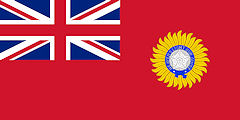
Der britische Superintendent der Southern Shan States an den Myosa (เมียวส่า, Chief) of Keng Cheng (Chiang Khaeng - เชียงแขง):
Abb.: Lage von Muang Sing (ເມືອງສີງ), dem Hauptort von Chiang Khaeng (เชียงแขง)
[Bildquelle: CIA. -- Public domain]
"There being reason to believe that the Myosa of Keng Cheng is under some misapprehension as to the position of his state, it is here by notified, by order of Her Majesty’s Government and under instructions from the Viceroy of India, that the whole State of Keng Cheng is subject to the supremacy of the British Government, and to no other Power. The Myosa and people of Keng Cheng are required to take note of this intimation." [Zitiert in: Manich Jumsai [มานิจ ชุมสาย] <1908 - 2009>: History of Laos. -- 2. rev., enl. ed. -- Bangkok : Chalermnit, 1971. -- 325 S. : Ill. ; 27 cm. -- Einbandtitel: A new history of Laos. -- S. 210]
1894

Paul Macey, Commissaire-Général Frankreichs in Chiang Khong (เชียงของ) und Chiang Saen (เชียงแสน) an den Saopha (ၸဝ်ႈၾႃႉ) des Fürstentums Chiang Khaeng (เชียงแขง):
Abb.: Lage von Chiang Khong (เชียงของ), Chiang Saen (เชียงแสน) und Muang Sing (ເມືອງສີງ, Hauptort von Chiang Khaeng เชียงแขง)
[Bildquelle: OpenStreetMap. -- Creative Commons Lizenz (Namensnennung, share alike)]
"By the agreement of the 9th month of the year 1255 (Oct. 1893) the Government of Siam gave over the State of Mong Hsing [Muang Sing - ເມືອງສີງ] to the French. All the territory to the left bank of the Mekhong River [ແມ່ນ້ຳຂອງ] to the East, up to the Hsip Hsawng Panna [Sipsong Panna - สิบสองปันนา / 西双版纳州] on the north - Mong La, Hsi Mau, 31 (this is quite unintelligible) was so handed over. The State of Chiengkheng [เชียงแขง] is on the left bank of the Mekhong on the East, and, according to the above agreement, now belongs entirely to the French Government. At present the Sawbwa [Saopha - ၸဝ်ႈၾႃႉ] of Chiengkheng, who lives at Mong Hsing, rules over the state. The territory on the left bank of the Mekhong to the east is, however, now subject to the officer of the French Republic resident at Chiengkhong and Chiengsen. The Sawbwa, his ministers, village headmen, and all the people of Chiengkheng must therefore understand that, according to the above-mentioned agreement, the Commissaire-Général of the French Republic, who looks after the Lao country has now at last extended his jurisdiction to Mong Hsing. You are therefore forbidden, without the permission of the French official at Chiengkhong, to levy taxes of any kind in the territory on the left bank of the Mekhong to the East. You are also informed that if the Sawbwa, his ministers, or any of his people have a case or dispute of any description, they must come to the French official at Chienkhong. The said official further orders the Sawbwa and his Ministers to make a complete list of the people and districts in Kengcheng State. This must show the number of people, the number of tax-payers, and their places of abode, and must be sent for information. This list of people living on the left hank of the Mekhong to the East must be sent by the Sawbwa to the official at Chiengkhong, and must be sealed with his seal. Dated at Chiengkhong, the 5th waning of the first month, 1256, by the French official who has settled at Chiengkhong and Chiengsen."
[Zitiert in: Manich Jumsai [มานิจ ชุมสาย] <1908 - 2009>: History of Laos. -- 2. rev., enl. ed. -- Bangkok : Chalermnit, 1971. -- 325 S. : Ill. ; 27 cm. -- Einbandtitel: A new history of Laos. -- S. 209f.]
1894

In Frankreich wird das Amt eines Unterstaatssekretärs für die Kolonien in ein Kolonialministerium (ministère des Colonies) umgewandelt. Erster Minister ist Théophile Pierre Delcassé (1852 - 1923)
Abb.: Théophile Pierre Delcassé
[Bildquelle: Jean Baptiste Guth. -- Vanity Fair. -- 1899-02-09]
1894

Paris (Frankreich):
Abb.: Plakat: "Nouveau Cirque... Boule de Siam : pantomime nouvelle..", 1894
[Bildquelle: Pal (1855-1942)]
1894 - 1897

Sir Maurice William Ernest de Bunsen, 1st Baronet (1852 - 1932) ist britischer Generalkonsul in Bangkok.
Abb.: Sir Maurice William Ernest de Bunsen, 1st Baronet mit Gattin Bertha Mary (geheiratet 1899), ca. 1905
[Bildquelle: Wikimedia. -- Public domain]
1894

The Otago Witness, Dunedin, Neuseeland über Bangkok:
| "[Bangkok] contains about 40,000 inhabitants of
whom 12,000 are priests in charge of hundreds of wats (temples). It is
pre-eminently a place for mosquitoes, smells, Chinese pawnshops, wild
dogs - the mangy curs are never touched by the timid and superlatively
lazy native priests and an agglomeration of police made up of dwarfs
shrivelled up like mummies and robbing, as far as size and appearance
goes from the cradle and the grave. The dead poor are thrown promiscuously in heaps outside the town boundary, and vultures, hogs and dogs wait ravenously for the corpses. The gaols are crowded with prisoners and now and then an attempt to escape results in the decapitation of a few as a warning to others. Side by side with the electric tram are the ricksha, garry and bullock cart of the East. These are a few of the points of interest striking a foreigner on entering the city." [Abgedruckt in: Burslem, Chris: Tales of old Bangkok. -- Hong Kong : Earnshaw, 2012. -- ISBN 13-978-988-19984-2-2. -- S. 67] |
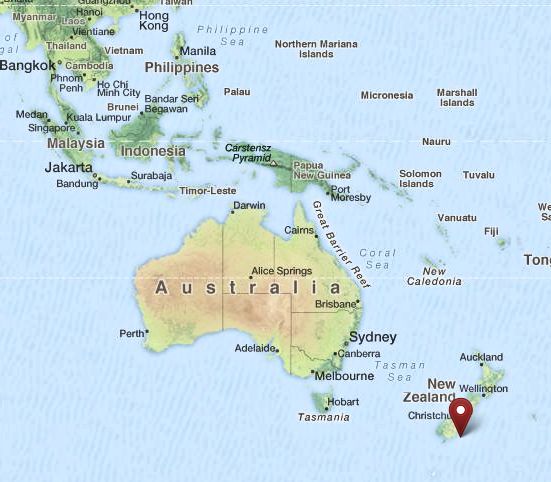
Abb.: Lage der
Landschaft Otago
[Bildquelle: OpenStreetMap. --
Creative Commons Lizenz (Namensnennung, share alike)]
1894

Als erstes Land der Welt führt Neuseeland den gesetzlichen Mindestlohn ein. Thailand wird in der zweiten Hälfte des 20. Jahrhunderts Mindestlöhne vorschreiben.
1894

Der deutsche Chemiker Moritz Traube (1826 - 1894) schlägt in der Zeitschrift für Hygiene und Infectionskrankheiten als "Einfaches Verfahren Wasser in grossen Mengen keimfrei zu machen" vor, Trinkwasser mit Chlorkalk zu entkeimen. Damit legt er die Grundlage zur Chlorung von Wasser, die auch in Siam/Thailand grundlegend werden wird.
Abb.: Chlor 65% (คลอรีน) zum Chloren, 2013
[Fair use]
1894

Es erscheint:
Miller, Thomas: Over five seas and oceans : from New York to Bangkok, Siam, and return : some reminiscences. -- New York : Metz, 1894. -- 120 S. : Ill.
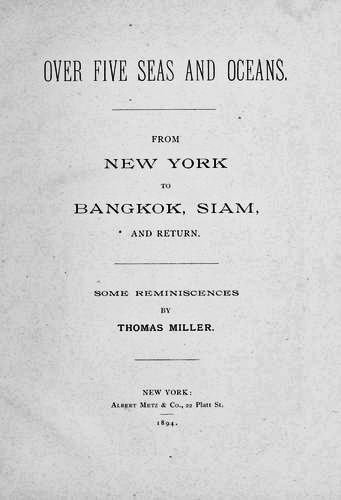
Abb.: Titelblatt
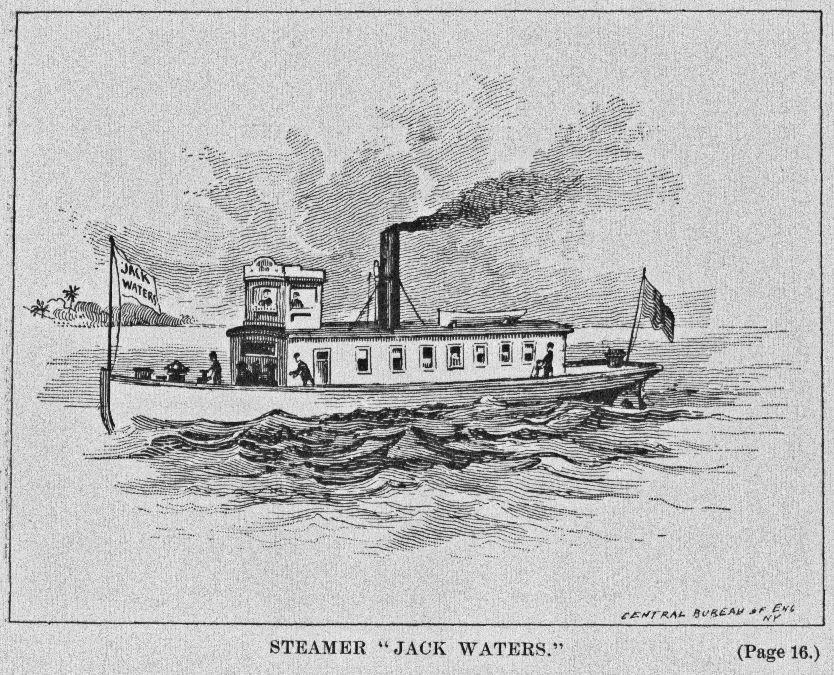
Abb.:
Dampfschiff Jack Waters, das zwischen Bangkok und der Mündung des Chao Phraya
verkehrt
[a.a.O., S. 16]
1894

USA: Henry G. Morris und Pedro G. Salom bauen Electrobat, das erste kommerziell gebaute Elektroauto.
Abb.: Morris und Salom auf Electrobat, 1894
[Bildquelle: Wikimedia. -- Public domain]
Abb.: An der Chulalongkorn University entwickeltes experimentelles Elektroauto, Bangkok, 2005
[Bildquelle: Ian Fuller. -- http://www.flickr.com/photos/18684820@N00/2648687487. -- Zugriff am 2013-08-23. -- Creative Commons Lizenz (Namensnennung, keine kommerzielle Nutzung)]
1894 - 2. Semester

Es erscheint in vier Folgen:
Fournereau, Lucien <1846-1906>: Bangkok. -- In: Le Tour du Monde : nouveau journal des voyages. -- Bd. 68 (1894, 2. semestre). -- S. 1-64. : Ill.
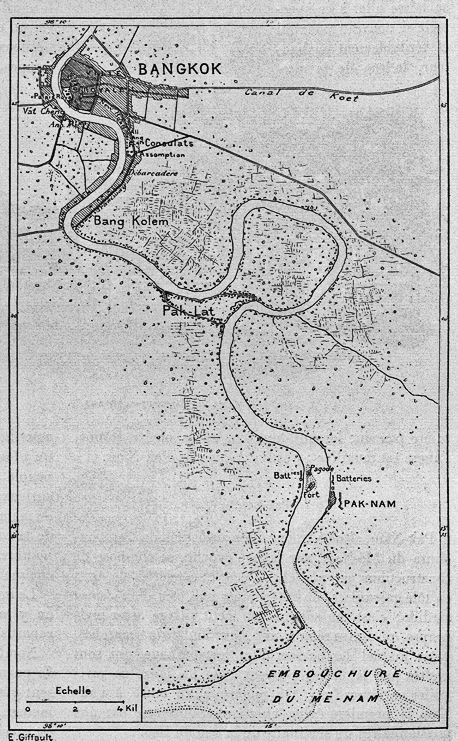
Abb.: Karte von Bangkok
[a.a.O., S. 3]
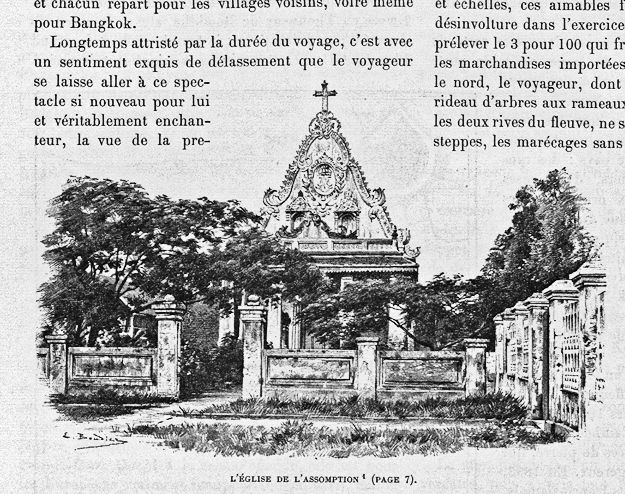
Abb.: Assumption Church (อาสนวิหารอัสสัมชัญ)
[a.a.O., S. 4]
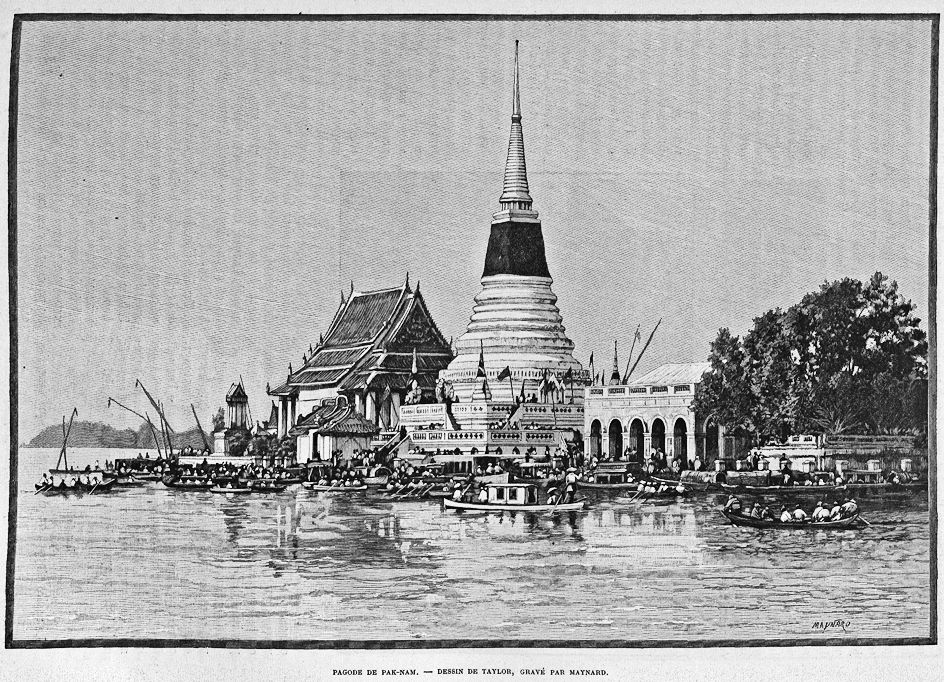
Abb.: Tempel, Paknam (ปากน้ำ)
[a.a.O., nach S. 4]
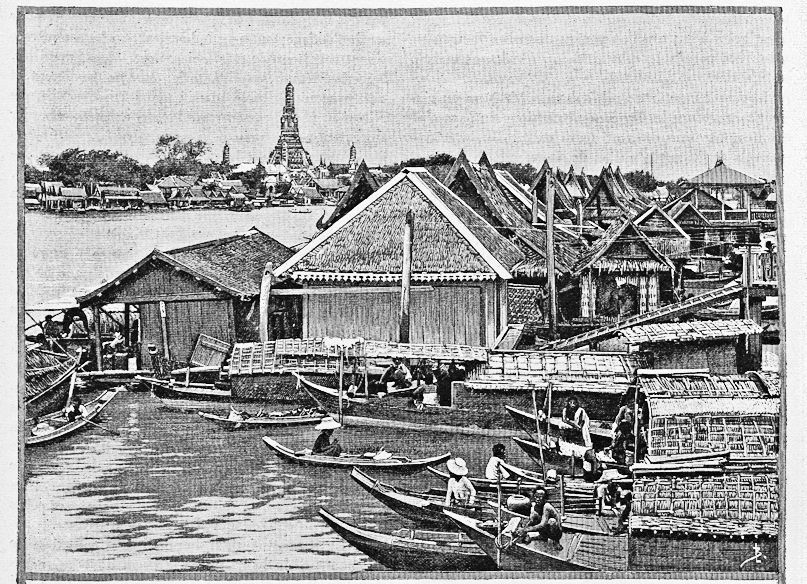
Abb.: Bangkok
[a.a.O., nach S. 9]
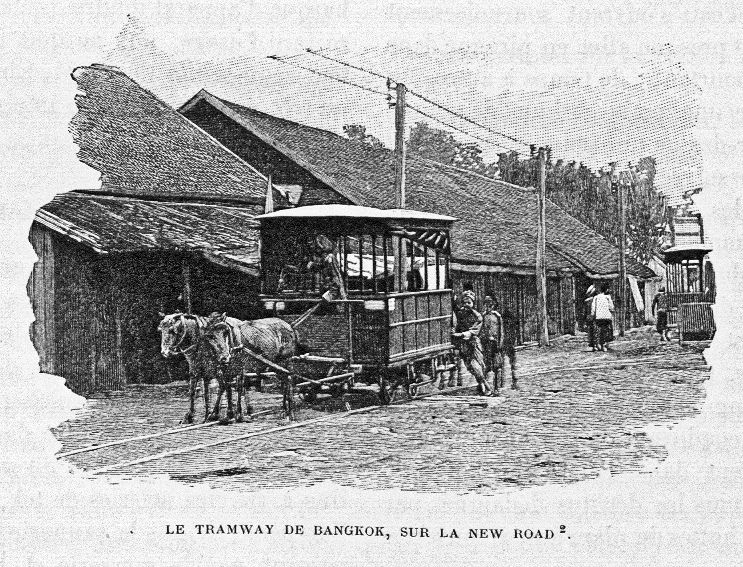
Abb.: Pferdestraßenbahn
[a.a.O., S. 16]
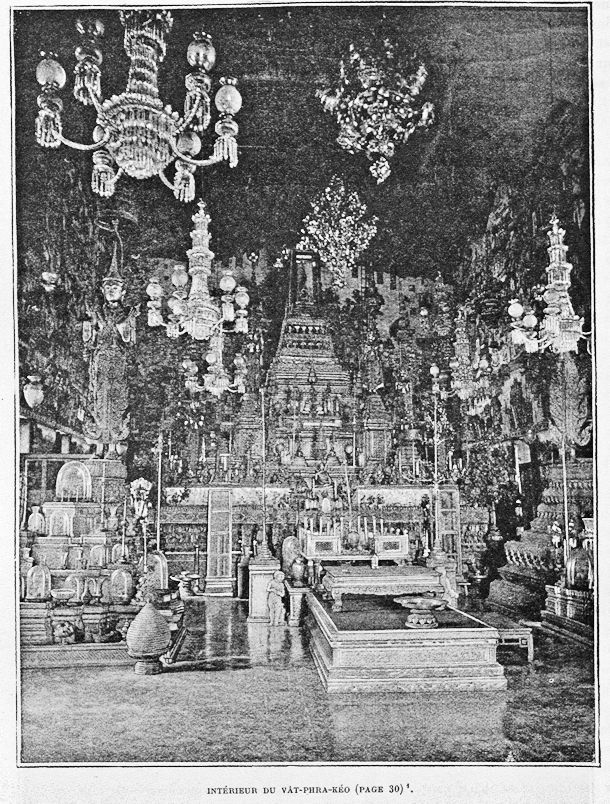
Abb.: Wat Phra Keo (วัดพระแก้ว)
[a.a.O:, S. 28]
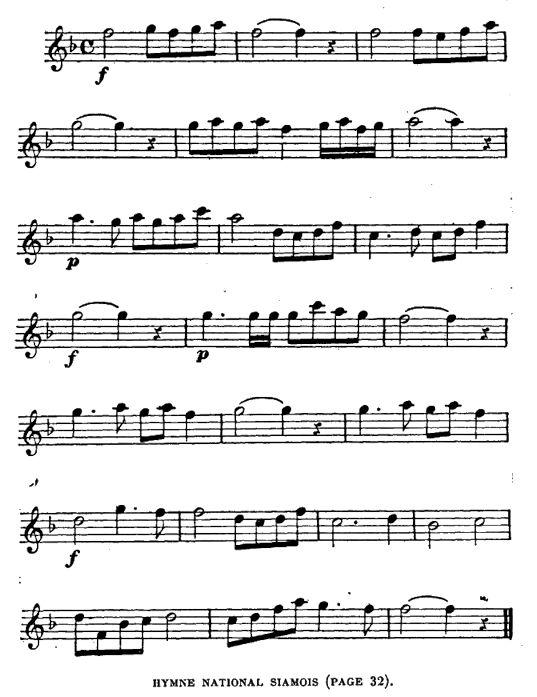
Abb.: Nationalhymne
[a.a.O., S. 31]
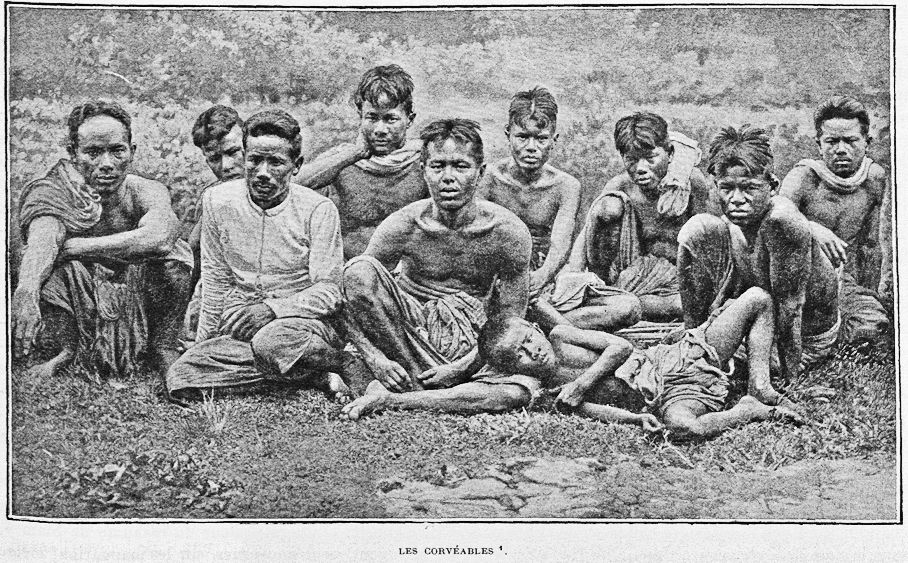
Abb.: Zum Frondienst Verpflichtete
[a.a.O., S. 34]s
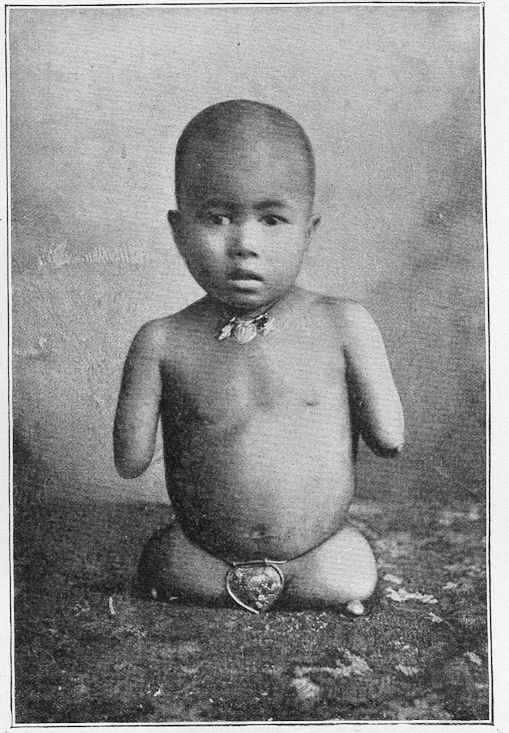
Abb.:
Missgebildetes Kind, bei einem Fest ausgestellt
[a.a.O., S. 43]
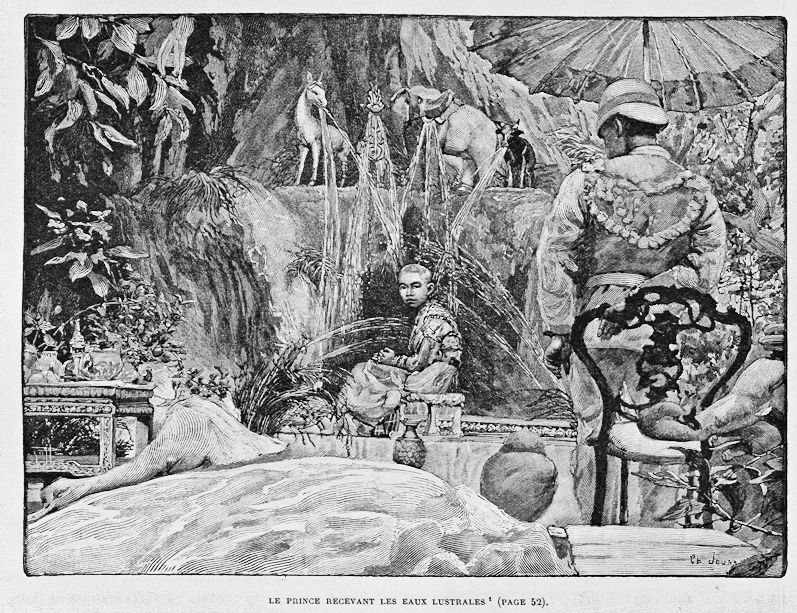
Abb.: Der Kronprinz
[a.a.O., S. 56]
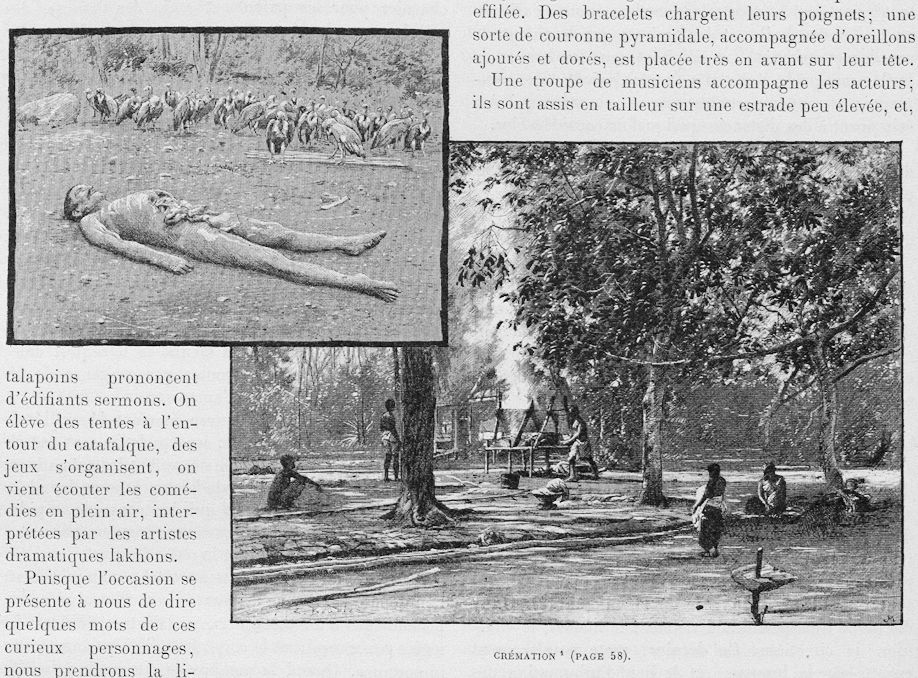
Abb.: Kremation
[a.a.O., S. 60]
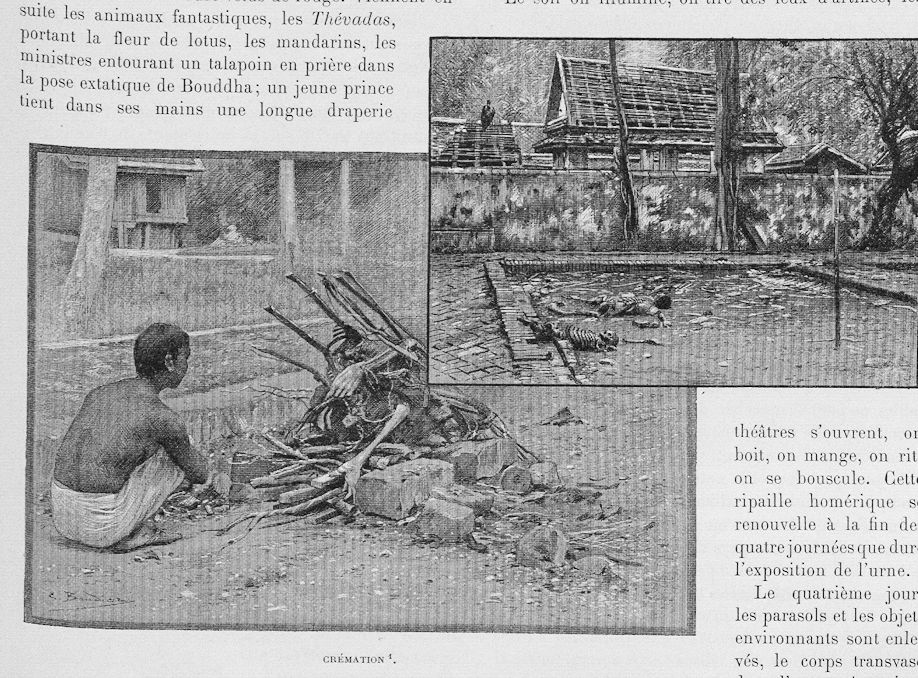
Abb.: Kremation
[a.a.O., S. 63]
1894
Es erscheint
Mémoirs et documents / publ. sous la direction de [Auguste] Pavie [1847 - 1925] et Pierre Lefevre-Pontalis [1864 - 1938]. -- Archéologie et histoire. -- 1. Fascicule. -- Paris : Leroux, 1894. -- (Mission Pavie, exploration de Indo-Chine)
"Certes les Siamois ont beaucoup [der laotischen Chroniken und Dokumente] détruit, beaucoup brisé, beaucoup emporté: mais, par cela même qu’ils agissaient en conquérants et qu'ils inspiraient la terreur sur leur passage, bien des choses leur échappèrent qui ne leur appartiendront jamais. — Pas plus que le besoin d'indépendance, ils ne sont parvenus à étouffer chez les populations laotiennes le souvenir de leur passé, ni à détruire les chroniques qui le célèbrent. Non seulement les membres de la mission Pavie s'en sont procuré de très importantes, mais, là même où leur disparition semblait évidente, ils ont acquis la certitude de leur existence. — « Tout a été brûlé ». disent les Siamois: ou bien encore: « Ces gens-là sont des sauvages. Comment pouvez-vous supposer qu’ils possèdent des livres? »
Singuliers sauvages que ces Laotiens, les frères aînés des Siamois, qui devraient du moins savoir les respecter, puisque c'est au nom de leur communauté d' origine qu'ils ont eu la prétention de les dominer.
Les Siamois sont très fiers de la grande expansion de la race thaï. — Ils élèvent parfois, vis-à-vis d' elle, des prétentions a une domination générale, qui n’a quoi que ce soit de justifié, car parmi les Thaïs, ils sont des puînés et même des sang-mélés. — Heureux seraient-ils, s’ils pouvaient faire naître chez leurs voisins du nord et de l’est, une sorte d irrédentisme; mais c'est un jeu dangereux: ils ne devraient pas oublier que c’est dans le Yunnan, et sur le sol annamite, qu'il faut aller chercher les héritiers directs de Khoun Borom, leur grand-aïeul.
Ce sont là des vérités notoires en Indo-Chine, mais il est bon de les faire connaître au public savant, et de les rappeler, en même temps, aux Siamois, qui se sont trop facilement imaginé que l’histoire de l'ancienne race des Laotiens disparaîtrait, en même temps que leur indépendance» sous les ruines qu'ils ont amoncelées, dans la vallée du Mékong. Fort heureusement il n'en est rien."
[Pierre Lefevre-Pontalis. -- a.a.O. -- S. XVIII - XIX]
1894-01-01

Abb.: Notre souhait de bonne année: LA PAIX
[Bildquelle: Le Petit journal : supplément illustré. -- 1894-01-01. -- S. 8]
1894-01
Innenministerium, Bangkok: Erstes Konferenz der Kommissare von Monthons (มณฑล)
1894-01

Frankreich entsendet Auguste Pavie (1847- 1925) mit folgenden Aufgaben ins Landesinnere
- Einrichtung französischer Konsulate in Nan (น่าน) und Korat (โคราช)
- Einrichtung von Treibstoff-Stationen für französische Kanonenboote entlang des Mekong (ແມ່ນ້ຳຂອງ / แม่น้ำโขง)
- Integration der 1893 annektierten Gebiete östlich des Mekong in die Verwaltung französisch Indochinas
Abb.: Lage von Nan (น่าน) und Korat (โคราช) sowie des Mekong (ແມ່ນ້ຳຂອງ / แม่น้ำโขง)
[Bildquelle: CIA. -- Public domain]
1894-01-01
Abb.: Neujahrskarte 1894
[Bildquelle: Riksarkivet (National... ). -- http://www.flickr.com/photos/59811348@N05/11416215175. -- Zugriff am 2014-02-16. -- Public domain]
1894-01-05
Ein Taifun zerstört in Mueang Chumphon (เมืองชุมพร) 1300 Häuser.
Abb.: Lage von Mueang Chumphon - เมืองชุมพร
[Bildquelle: OpenStreetMap. -- Creative Commons Lizenz (Namensnennung, share alike)]
1894-01-12

Bangkok: Eröffnung des Fotostudios "Messrs Lenz and Kleingrothe" der Deutschen Robert Lenz (1864 - 1939) und Carl Joseph Kleingrothe (1864 - 1925).
1894-01-22

Das französische Abgeordnetenhaus billigt den Vertrag zwischen Frankreich und Siam.
1894-02-18

Der britische geschäftsführende Generalkonsul James George Scott (1851 - 1935) an den britischen Außenminister Archibald Philip Primrose, 5. Earl of Rosebery, 1. Earl of Midlothian (1847 - 1929):
"[Auguste Pavie {1847 - 1925}, French Minister in Siam] appears to have formed the idea that the bullying methods of M. Le Myre de Vilers [Charles LeMyre de Vilers, 1833-1918, französischer Gesandter] are the most effective with the Siamese.... It will be very difficult to prevent undue concessions to France being wrung from the timidity of the counsellors of the country by this navy method of diplomacy." [Zitiert in: Tuck, Patrick J. N.: The French wolf and the Siamese lamb : the French threat to Siamese independence, 1858-1907. -- Bangkok : White Lotus, 1995. -- 434 S. : Ill. ; 22 cm. -- ISBN 974-8496-28-7. -- S. xviii]
1894-03-01

Die Firma Hildebrand & Wolfmüller in Bamberg (Deutschland) beginnt mit der Produktion des ersten serienmäßig hergestellten Motorrads der Welt.
Abb.: Hildebrand & Wolfmüller Motorrad 1894, 2005
[Bildquelle: Joachim Köhler / Wikipedia. -- GNU FDLicense]
Abb.: Motorrad, Kalasin (กาฬสินธุ์), 2008
[Bildquelle: Marshall Astor. -- http://www.flickr.com/photos/15965815@N00/2491562568. -- Zugriff am 2013-10-06. -- Creative Commons Lizenz (Namensnennung, share alike)]
1894-03-05 - 1895-06-22

Archibald Primrose, 5th Earl of Rosebery (1847 - 1929) ist Prime Minister Großbritanniens.
Abb.: Archibald Primrose, 5th Earl of Rosebery / von Leslie Ward (1851 - 1922]
[Bildquelle: Vanity fair. -- 1901-03-14 / Wikimedia. -- Public domain]
1894-03-16

Abb.: Lage von Wat Saket (วัดสระเกศ)
[Bildquelle: OpenStreetMap. -- Creative Commons Lizenz (Namensnennung, share alike)]
"Ich wohnte hier in Bangkok in Wat Saket (วัดสระเกศ) der Leichenverbrennung eines chinesischen Kulis bei. Der Scheiterhaufen war etwa 1,40 m lang, 50 cm hoch und 70 cm breit. Die Leiche wurde mit dem Bauch nach unten auf den Scheiterhaufen gelegt. Die Beine wurden zurückgeschlagen, weil der Scheiterhaufen nicht lang genug war, sodann wurde er in Brand gesetzt. Eine deratige Verbrennung kostet nur einen Tical. Je mehr Geld für die Verbrennung verausgabt wird, desto größer ist der Scheiterhaufen. Leute die überhaupt kein Geld für die Verbrennung ausgeben können, werden von den Geiern aufgefressen, nachdem der Körper durch die Priester zerlegt worden ist." [Quelle: Weiler, Luis <1863 - 1918>: Anfang der Eisenbahn in Thailand. -- Bangkok : Chalermnit, 1979. -- 282 S. : Ill. ; 19 cm. -- S. 67]
1894-03-20

Frankreich: Bildung eines selbständigen Ministère des Colonies. Bisher waren die Kolonien einem Department des Handelsministeriums, bzw. bis 1889-03 des Marineministeriums zugeordnet.
Von 1894 - 1930 hat das Ministerium 46 verschiedene Minister.
1894-03-22

Gründung der protestantischen Missionsstation in Phrae (แพร่) mit 12 Mitgliedern.
Abb.: Lage von Phrae (แพร่)
[Bildquelle: CIA. -- Public domain]
"In 1893, the entire region around both Lampang and Phrae suffered from a severe famine. Peoples from Lampang spent a month in Phrae during the earlier part of the year distributing food and carrying out relief work. He observed a new receptivity to Christianity there and took it upon himself to initiate plans for a station. Yet again, mission letters echo with the demanding, pleading requests to the Board for permission to open a new station: it is urgent! the time is now! the moment will be lost!
Dr. William Briggs, a young missionary doctor, spent the months of May and June 1893 in Phrae making further preparations for a station even though permission had not yet come from the Board. Briggs found about twelve Christians around Phrae, all of whom had heard about Christianity in Lampang, and another two dozen or so inquirers. Permission for the new station finally came in July 1893, and the mission appointed Briggs to open the station.
The Phrae Church was started with twelve members on 22 March 1894, and by August the new congregation numbered 27 members and had elected its first two elders, both employed by the station as full-time evangelists. Education work began in about July 1894 when Anabelle Briggs started a literacy class for women and girls. Soon thereafter Lillian Shields, another new missionary, started a class for small children.
The small Christian community in Phrae experienced repression from the beginning. Government officials in the city moved to prevent conversions and attempted to punish converts by unfairly calling them to do corvee labor. The Chao Muang tried to force two young Christian girls, both servants of the Briggs' into concubinage. In this case, Briggs, a Canadian, threatened to turn the matter into an international incident by asserting his treaty rights as a British subject. The situation quieted down. However, more generally repression continued into 1895, and Briggs gave so much time towards securing Christians' rights that Speer, Secretary of the Board, expressed his concern about the ''native Christians" getting too much political help from missionaries. "
[Quelle: http://www.herbswanson.com/_get.php?postid=44. -- Zugriff am 2014-03-07]
1894-04-23

Auguste Pavie (1847- 1925) berichtet, dass Phra Datsakhorn, der siamesische Grenzkommissar, sich mit 60 Dienern in der 25 km Sperrzone entlang des Mekong (ແມ່ນ້ຳຂອງ / แม่น้ำโขง) bewegt, dies seien nicht anderes als getarnte militärische Truppen und damit ein Vertragsbruch. Auch übe der siamesische Gouverneur von Phichai (พิชัย) administrative Funktionen aus über laotisches Gebiet westlich des Mekong, statt dies vertragsgemäß laotischen Autoritäten zu überlassen.
Abb. : Lage von Phichai (พิชัย)
[Bildquelle: OpenStreetMap. -- Creative Commons Lizenz (Namensnennung, share alike)]
1894-05-24
Elektrifizierung der Bangkoker Straßenbahn vollendet.
Abb.: Feierliche Eröffnung der Straßenbahn
Abb.: Straßenbahn, Bangkok, um 1900
[Bildquelle: The kingdom of Siam : Ministry of Agriculture, Louisiana Purchase Exposition, St. Louis, U.S.A., 1904 ; Siamese section / ed. by A. Cecil Carter. -- New York: Putnam’s Sons, 1904. -- Nach S. 112]
1894-05-31 - 1895-10-31 ; 1896-04-24 - 1898-06-14

Gabriel Albert Auguste Hanotaux (1853 - 1944) ist französischer Außenminister. Er ist skeptisch gegenüber einer Erweiterung des französischen Kolonialreichs, muss aber auf die parti colonial Rücksicht nehmen.
Abb.: Gabriel Albert Auguste Hanotaux
[Bildquelle: Jean Baptiste Guth (1883 - 1921). -- In: Vanity Fair. -- 1896-11-12. -- Public domain]
1894-06-08


"Hinlap [หินลับ], 8. Juni 1894
Abb.: Lage von Hinlap [หินลับ]
[Bildquelle: OpenStreetMap. -- Creative Commons Lizenz (Namensnennung, share alike)]Am 12. Dezember 1891 wurde der Vertrag zur Erbauung der Koratbahn mit den Unternehmer Murray Campbell abgeschlossen. Dieser hatte sich verpflichtet, die Bahn in fünf Jahren zum Preis von 10 Millionen Tical fertig zu stellen. Der erste Spatenstich fand in den ersten Monaten des Jahres 1892 statt und wurde mit großem Pomp gefeiert. Auch der König wohnte der Feier bei und hat selber den ersten Spatenstich vorgenommen. Als ich im Februar 1893 hierher kam, ergab sich folgendes Bild. Der Unternehmer besaß die Pläne von Bangkok bis km 133. Zwischen km 133 und km 160 arbeitete der nunmehr verstorbene Kollege Kaepler an dem Ausstecken der Linie. Zwischen km 112 und 120 waren die Erdarbeiten in Angriff genommen worden. Von Bangkok bis Ayuthia [อยุธยา] (km 70) wurde auf der ganzen Strecke ziemlich energisch gearbeitet. Es bestanden drei Bausektionen. Mir wurde sofort die Einrichtung einer vierten Bausektion übertragen. Während meiner Amtsperiode sind die Erdarbeiten auf der Pak Preo Sektion [Pak Phriao - ปากเพรียว] von km 93 bis km 127. 5 fertig gestellt worden. Diese Erdarbeiten boten keine Schwierigkeiten, da das Land auf dieser Strecke ganz flach ist und der Damm aus Seitenentnahmen hergestellt werden konnte. Bei km 112 liegt der erste Einschnitt in der Tiefe von 3, 80 m. Im Juni begann der Unternehmer von Pak Preo aus nach aufwärts den Oberbau zu verlegen.
Abb.: Lage von Pak Preo [Pak Phriao - ปากเพรียว]
[Bildquelle: OpenStreetMap. -- Creative Commons Lizenz (Namensnennung, share alike)]Als ich am 14. Oktober vergangenen Jahres in Hinlap [หินลับ] eintraf, hatte der Unternehmer bereits mit den Rodungsarbeiten begonnen. Der Fortschritt der Arbeiten in den folgenden Monaten ließ aber viel zu wünschen übrig. Als Ingenieur des Unternehmers figurierte Herr Dix, welcher sehr bald zeigte, dass er den Schwierigkeiten einer Gebirgssektion nicht gewachsen war. Er wurde deshalb im Januar entlassen. An seine Stelle trat Herr Knight. Aber auch er war den Schwierigkeiten in keiner Weise gewachsen. Seit einigen Tagen ist auch er vom Unternehmer entlassen worden und verlässt Hinlap, um einer ungewissen Zukunft entgegenzugehen. Sein Nachfolger ist Herr Braine, der zuvor in Mexico beim Bahnbau tätig war. Der Oberingenieur des Unternehmers, Herr Mitchell, hat auch keine irgendwie nennenswerten Erfahrungen im Eisenbahnbau. Er ist nicht in der Lage, seinen Ingenieuren praktische Vorschläge zur Förderung der Arbeiten machen zu können.
Zwischen dem Unternehmer und dem Generaldirektor ist es mehrfach zu Differenzen gekommen, welche schließlich zu einem Schiedsgericht führten, das vor kurzem in London tagte und in der Hauptsache zu Gunsten des Unternehmers entschieden hat und ich kann wohl sagen mit Recht. Es handelte sich in erster Linie um die verspätete Übergabe der Pläne.
Seit Januar dieses Jahres ist die sechste Bausektion Muok Lek [มวกเหล็ก] eingerichtet worden. Als Sektionsingenieur fungiert ein Däne namens Rahbeck, ein tüchtiger Mann.
Abb.: Lage von Muok Lek [มวกเหล็ก]
[Bildquelle: OpenStreetMap. -- Creative Commons Lizenz (Namensnennung, share alike)]Herr Gittins, ein englischer Ingenieur des royal railway department war mit den generellen Vorarbeiten der Linie Korat—Nongkai [โคราช - หนองคาย] am Mekong [ແມ່ນ້ຳຂອງ / แม่น้ำโขง] beauftragt worden. Am 20. Februar kam er auf seiner Reise dorthin nach Hinlap. Dieser Tage traf er wiederum hier ein, nachdem er die Vorarbeiten für die 355 km lange Strecke fertig ausgeführt hatte. Die Linie führt im allgemeinen durch vollkommen flaches Land, das meistens mit leichtem Buschwerk bestanden ist und nur zuweilen von Reisfeldern unterbrochen wird. Zwei Flüsse von etwa 100 m Breite sind zu überbrücken. Die Ausführung dieser Bahnlinie bietet also gar keine Schwierigkeiten. Herr Gittins hat seine ersten Erfahrungen bei der großen kanadischen Eisenbahn gesammelt. Seit sechs Jahren ist er in Siam und zwar fast immer bei Eisenbahnvorarbeiten tätig. Er hat an den Vorarbeiten für die Linie Bangkok - Chiengmai [เชียงใหม่] teilgenommen, dann an den Vorarbeiten unserer Linie. Es gab damals Momente, wie er mir sagte, wo sie daran verzweifelten, eine Linie durch die Hinlapberge aufzufinden. Tagelang irrten sie mit einem Kompass und Aneroid [Dosenbarometer] sich mühsam mit der Axt einen Weg durch den Dschungel bahnend umher und konnten keinen Ausweg finden.
Abb.: Linie Korat—Nongkai [โคราช - หนองคาย]
[Bildquelle: OpenStreetMap. -- Creative Commons Lizenz (Namensnennung, share alike)]Ich fürchte, wir werden für lange Zeit keinen Fortschritt zu verzeichnen haben. Auf meiner Sektion arbeiten augenblicklich nur 50 Mann. Der Unternehmer entschuldigt sich damit, dass die Leute wegen des Regens nicht arbeiten wollen. Das ist alles leere Ausrede. Der Chinese arbeitet stets, selbst unter den schwierigsten Verhältnissen, wenn es etwas zu verdienen gibt. Das ist weltbekannt. Ich habe im vorigen Jahr zur Regenzeit an tausend Chinesen auf meiner Sektion arbeiten sehen, welche teilweise bis zu den Knien im Wasser der Reisfelder stehend die Erde in Klumpen auf ihre Schultern luden, um damit den Eisenbahndamm aufzubauen. Wenn also die Chinesen hier die Arbeit verlassen, so muss das einen anderen Grund haben und zwar den der mangelhaften Bezahlung. Man gewinnt den Eindruck, als ob die Unternehmung vor dem Bankrott stünde. Leider spielen hier auch politische Gründe mit. England lässt sich eine Eisenbahnunternehmung, zumal in einem Lande wie Siam, das die Engländer gerne zu ihrer Kolonie machen möchten, nicht so leicht entwinden, hat doch sogar der englische Ministerpräsident Lord Rosebery [Archibald Philip Primrose, 5. Earl of Rosebery, 1. Earl of Midlothian, 1847 - 1929] in der Schiedsgerichtsangelegenheit sich für die englische Unternehmung verwandt."
[Quelle: Weiler, Luis <1863 - 1918>: Anfang der Eisenbahn in Thailand. -- Bangkok : Chalermnit, 1979. -- 282 S. : Ill. ; 19 cm. -- S. 72 - 75]
1894-06-15

New York (USA): Eröffnung des Ocean Parkway Bike Path, des ersten getrennten Fahrradwegs der Welt. Bangkok ist auch 2014 noch nicht Fahrrad-freundlich.
Abb.: Eröffnung des Ocean Parkway Bike Path, 1894-06-15
1894-06-18

Auguste Pavie (1847- 1925) berichtet französischen Außenminister Albert Auguste Gabriel Hanotaux (1853 - 1944), dass 1893-11 ein siamesischer Offizier mit seiner Truppe den siamesischen Teil (rechts / westlich des Mekong / ແມ່ນ້ຳຂອງ / แม่น้ำโขง) von Luang Prabang (ຫຼວງພະບາງ) besetzt habe und die Verwaltung des französischen Teils links / östlich des Mekong verunmögliche.
Abb.: Verlauf des Mekong (ແມ່ນ້ຳຂອງ / แม่น้ำโขง) bei Luang Prabang (ຫຼວງພະບາງ)
[Bildquelle: OpenStreetMap. -- Creative Commons Lizenz (Namensnennung, share alike)]
1894-06-20

Der Schweizer Bakteriologe Alexandre Émile Jean Yersin (1863 - 1943) entdeckt in Hongkong den Erreger der Pest, das Bakterium Yersinia pestis.
Abb.: Yersinia pestis in Yersins Veröffentlichung seiner Entdeckung. -- In: Annales de l'insitut Pasteur, 1894
[Bildquelle: Wellcome Images. -- Creative Commons Lizenz (Namensnennung, keine kommerzielle Nutzung)]
1894-07

Morant, Robert Laurie <1863 - 1920>: Srictly private and confidential memorandum on the present political situation in Siam : the misleading nature of the current reports thereon and the grave condition of her internatl affairs. -- Abgedruckt in: Morant, Robert Laurie <1863 - 1920> ; Pritsdang [ปฤษฎางค์] <1851 - 1935>: Two views of Siam on the eve of the Chakri reformation : comments by Robert Laurie Morant and Prince Pritsdang / edited and introduced by Nigel Brailey. -- Whiting Bay : Kiscadale, 1989. -- 163 S. : Ill. ; 23 cm. -- ISBN 1-870-838-25-4. -- S. 85 - 105
"In order to make still more sure, before writing this Memorandum, of the very latest developments both of opinions and of events, I spent my last week in Siam (in July of this year) in going round privately to all my friends amongst the Siamese, and having long and confidential talks with each and all, upon the condition of affairs, the state of opinion, the feelings of the people, and the probable outcome of the present situation; and to obtain a comprehensive judgment I embraced, in my rounds, the most thoughtful, sensible and far-sighted men amongst the Royal Princes, the Officials of the Government, the educated classes and the common people, obtaining in the strictest confidence the real individual opinion of each; and I must confess to being considerably startled by the unanimity with which the gravity of the situation, the imminence of the dangers, and the irremediable decay of the body politic, were emphasized. And the urgent need for immediate outside help if Siam were to be saved as a nation, was earnestly pressed upon my attention, in a manner that left no doubt of the sincerity of the belief and the despair of the speakers. There are, I think, three points of prime importance in which European information is just now chiefly astray, that make the position here wholly different from that of July last year or of any previous period, and cause the real difficulty—for European observers—in gauging the probabilities as to Siam’s destiny, or in realising the futility of expecting the prolongation of her independent integrity, or indeed in calculating the effects of adopting any particular policy towards her. These points are:
- The complete collapse of the (so-called) Cabinet of Ministers, which had so much to say in the events of July 1893, and was practically the chief cause of the acute nature of last year’s crisis with the French.
- The novel and perplexing attitude which the King now preserves towards—
- politics generally,
- his brothers in the Government,
- the future of his dynasty.
- C. The complete change in the status of Prince Devawongse (the Minister of Foreign Affairs who has hitherto chiefly controlled the foreign and internal policy of Siam) in relation both to the King, to his brother princes, to the people, and to his own position in the Government.
In order to sufficiently appreciate the real significance of the change on each of these three points, it is necessary to understand the original state of things with regard to them; a matter of some intricacy, which is very little understood by any Europeans.
I will endeavour to compress into as small a compass as possible the essential elements both of the change, and of the present conditions, as effecting [sic] the immediate fate of Siam. As regards my first head: -
Collapse of Cabinet
A. It must be remembered that the Cabinet, as a complete entity— a body of ministers to whom power and responsibility were delegated by the King—was created as recently as 1891. It spent its first year of office in some fair amount of combined cooperative effort towards effecting wise changes in Government arrangements. In its second year it rapidly began to realise the potentialities of its position and powers, and vastly extended the scope of its influence, and grievously abused its opportunity for gratifying personal enmities; a course of conduct which was assisted and hastened by the unprecedented length of the King’s absence from the seat of Government; for His Majesty discovered, unfortunately for the country’s welfare, during his unexampled stay of nine consecutive months at the sea side, the pleasure of irresponsible ease and the happiness of having cut himself free from all worries by the simple process of delegating all responsibility to his Cabinet and leaving all unpleasant questions to their decision. With this rapid growth of their sense of power there speedily arose also a growth of internal dissensions and jealousies, as was natural amongst a collection of half-brothers entirely deficient in public spirit, actuated wholly by self-interest, and carried away by frequent gusts of mutual suspicion and distrust. In its third year, when the King was just acquiring an acute realisation that he had irrevocably sold his birthright of once absolute and independent power for a mess of ease and leisure, and by his own act had (to use his own words to myself) reduced himself to the condition of a tall palm tree whose conspicuous head would still have to meet the blasts of the storm but with its roots destroyed, at this juncture came the French crisis with all its alterations in Siamese policy so inexplicable to European observers, of bluff and terror, firmness and vacillation, triumph and submission; and the King made a despairing effort to revive his old grip over the Government; but the Cabinet still practically held sway and amidst the multitude of clashing interests the now well-known events of 1893 succeeded each other as the natural outcome of the above described relations of King and Government, and of the internal jealousies, mutual suspicions, and fraternal enmities, which deprived the Cabinet of any combined action, destroyed all consultative cooperation and defeated all attempt at any permanent or consistent policy. The details of the deliberations of this Cabinet during June and July ’93 are still vivid in my memory; they would, if one could put them down literally and faithfully, form a chapter of the most grotesque and farcical kind of history, though in truth they would require the pen of a Juvenal to do them justice. Prince Svasti [Svasti Sobhana - สมเด็จพระเจ้าบรมวงศ์เธอ พระองค์เจ้าสวัสดิโสภณ กรมพระสวัสดิวัดนวิศิษฎ์, 1865 - 1935] was the member who caused the most dissension and the worst scenes in the Council; indeed his tones and actions in the council room became in time so gross as to absolutely terrorise his brothers into the wildest plans; and he latterly took to behaving in such a fashion as to make any courteous interchange of opinions impossible during his presence at the table; a fact of which one might give many interesting examples in detail. However, the tension was at last slightly relieved by his being persuaded to take himself out of the country in August under the pretext of an important “Diplomatic Mission” to France, to the immense relief of the King and the remaining ministers; and Prince Devawongse [Devawongse Varopakar - สมเด็จพระเจ้าบรมวงศ์เธอ กรม พระยาเทวะวงศ์วโรปการ, 1858 - 1923] was at last left alone and in peace to complete the negotiations with Mons. Myre de Vilers [Charles Marie Le Myre de Vilers, 1833 - 1918] for the Convention with the French Government. And the Cabinet of Prince Ministers melted away and ceased to be a factor in the situation. From that time, August ’93 until now, July ’94, the Cabinet has held positively no formal meetings for the proper discussion of affairs of state. For it was nearly the end of September ’93 before the Convention with France was finally settled, during which interval of anxiety and suspense no one gave any thought to the ordinary affairs of the kingdom. And immediately after this, the Jubilee Ceremonies in honour of the 25th year of the King’s reign absorbed the whole attention of the King, Ministers, and Court, until the middle of December. Immediately after the Jubilee, His Majesty’s illness took an acute form, and he transacted no business of State at all, and would permit no questions of any sort to be brought to him, while he persistently abstained from calling the Cabinet together or from handing over to their decisions even the most urgent matters of State.
Thus the Cabinet has never met for effective purposes of Government from that day to this, practically twelve months, and the machinery of State has simply kept up a semblance of going on by its momentum of the past, and the lucky absence of any opposing force; but it has entirely lacked any active Power in itself to fulfil its proper Functions. Moreover, during the six months of this present year the various Prince-Brothers who composed the Cabinet have infinitely increased their mutual jealousies, and from this fact, combined with the King’s extreme physical weakness and Prince Devawongse’s loss of prestige (with both of which points I will deal below) there has resulted an entire cessation of all cabinet action and of any ministerial activity. In fact, the Cabinet, as a responsible body engaged in conducting the Government of the Country, has entirely collapsed and ceased to give any signs of its existence. The three most important ministers of State have stayed in idleness at the seaside resort from March till June, leaving their departments untouched and the permanent staff helpless. The king has now at last (July 1st) returned to the Capital and these ministers of course with him, and it might have been supposed that the Cabinet would now be summoned, or would spontaneously meet, to deal with the long arrears and the urgent needs of state business. But the King still refuses to take any consultation upon any Government questions, though some matters of the gravest moment require immediate settlement, and, having the fullest distrust of everyone [sic] of the ministers and of his half-brothers, he still refrains from summoning the Cabinet or giving any sort of start to the transaction of state affairs. Even the money necessary for the present year [’s expenses] has not yet (July) been voted upon or granted; and as the King obstinately refuses to deal with the situation, the various departments have at last been reduced by their four months arrears to the necessity of borrowing from the Treasury “on loan account” for their immediate needs on the basis of last year’s budget, leaving the newer requirements of the current year still un-met.
Moreover, even if the Cabinet be summoned during the next few weeks, when we take into consideration the present bitter dissensions that are raging amongst the Prince-Ministers, the absence of any control or guiding hand over them such as Devawongse once held, and the abstention on the King’s part from all authoritative decision and from any firm exercise of judgment upon what the Cabinet shall take in hand, it must be considered as practically certain (by anyone who sees the facts and the circumstances from within as they really are) that no useful or new developments of policy, nor even a careful maintenance of the old apology for the same, can now he hoped for from the Siamese Government, and that there is no possibility that the country will be saved from the internal disorder, growing anarchy, and impending ruin which are already beginning to overwhelm the provinces of the interior owing to the lack of all Government action and the complete apathy and inaction of every one of the Departments and Ministers of State. Dacoity, a thing unknown in Siam until 1893, is now rampant; paddy cultivators dare not bring down [the river to Bangkok] their boats except in fleets; buffaloes can no longer be safely herded; boats are openly attacked; pack caravans travel with loaded guns at every 20 yards; and
“the profession of plunderer is the only one which makes a living”,
as was said to me the other day by one who was a most respected and well-standing farmer a few months ago. The most outspoken disaffection and indignation now exists among the lower officials and the people against the Government which is now, as they say,
“leaving the country to go to ruin, while the Prince-Ministers are engaged in biting each other to pieces, and the king sleeps in apathetic indifference to the disasters of his people, who have been squeezed for 25 years to provide him with his palaces, his women and his scores of children, and his innumerable pleasures, and nothing has been done for the good of the people. ”
These strong expressions of feeling, which one may hear from hundreds of lips, in a people who have hitherto been conspicuous for their meek submission and unvarying deep-seated loyalty, not to say servility to the King and Princes, is [sic] a most convincing proof of the enormous changes that have taken place in Siam, of the gravity of the dangers which now threaten her existence internally, and the urgent need for some outside help. So deadly is the mutual hatred, and so implacable the suspicion, amongst the Prince Ministers, that nothing can be hoped for from the Cabinet as regards making proper decisions of policy, or indeed taking any decisive steps, whether towards the French or towards the English governments. The State must perish of internal decay and thus silently become a prey to whoever be ready on the spot to absorb it at the opportune moment, unless outside aid in the shape of extraneous will-power and effective influence and authority be speedily introduced into the dying body of Siamese administration. The more clever and shrewd among the upper classes are fully alive to the situation, and are making great efforts to scrape together what they can before the coming storm; those in a position to squeeze money, by whatever means, are hurriedly making hay while the sun shines; the officials, each and all, are thinking—nay, in safe confidence they are saying—
“How can I save my skin? How can I best come out on top of the wave? Only let us have done with this terrible long drawn-out delay! We cannot be worse off than we are! The people of Siam cannot be in worse plight! As England will not help us, and has declined to interfere to save us both from France and still more from ourselves, let the blow fall quickly and after that—the deluge! ”
Indeed, I am by no means exaggerating the present state of feeling; I hardly know how to find words in English to render the forceful expressions of the native speech.
So great is the distress at England’s persistent refusal to help and the disappointed disgust at her (rumoured) definite rejection of Siam’s invitation, and so complete is the despair at the general hopeless condition of things, that already the wave of feeling is turning towards the French, already it is beginning to be conceived that even French rule cannot be so bad as this actual misrule, and it wants but a slight occasion or pretext for French action, and the destiny of the country will be at once fixed and French schemes peacefully and innocently fulfilled, and no amount of professed “interest on the part of England in preserving the integrity of Siam”, will have availed to prevent the final loss to England of what might have been amongst the finest, richest and the most loyal of her Eastern possessions, or at least allies. And yet still there is time, if only the situation were clearly understood, and the various elements intelligently and sympathetically fused and combined into a new condition, by the introduction into their midst of the one thing lacking, viz. the molecular force of European will, energy and purpose. Will this be done or will the opportunity be lost? The next three months will have shown."
[a.a.O., S. 87 - 93]
1894-07/12

Es erscheint:
Louis, Henri: The river Telubin. -- In. The Geographical journal. -- Vol. 4 (1894-07/12). -- S. 219 - 237
Über Yala (يالا / ยะลา) und Pattani (ڤتنا / ปัตตานี):
Abb.: Lage von Yala (يالا / ยะลา) und Pattani (ڤتنا / ปัตตานี)
[Bildquelle: OpenStreetMap. -- Creative Commons Lizenz (Namensnennung, share alike)]
"From Biserat to the capital of Jala [Yala - يالا / ยะลา] is only about a three hours' journey along a rough jungle track. The capital lies on the western edge of one of the before-described plateaux, surrounded by steep limestone cliffs. There is nothing distinctive about it or about the residence of the rajah, who is an old man of apparently very limited intelligence and not much authority. He seems to play a comparatively subordinate part, leaving most of the administration of the affairs of his state to his ministers; in so far, he may be said to be rather more of a constitutional ruler than is customary among the Malays. His state is very sparsely populated, the number of men being estimated as little more than one thousand. There may be said to be no interior to this state; the whole active life of which is confined to the river Patani [แม่น้ำปัตตานี]. I followed a native track through the jungle for two days without coming to a single habitation. The river Patani, on the other hand, is fairly well populated. This river may be spoken of as well known, it having been ascended and descended very often by Europeans whilst the galena-mines near Goa Tumbus were being worked. I do not accordingly think it necessary to say much about it, more especially as in its whole course it presents nothing on either side but a series of low sand banks, covered with dense jungle, relieved by an occasional village, whilst higher up near its source it winds its way past numerous steep and picturesque limestone escarpments. The geology of this river is utterly different to that of the Telubin. There are neither shales here nor granitic outcrops; only sand and limestone, the latter being, as already mentioned, conspicuously absent from the valley of the Telubin. Near its mouth the Patani splits into several branches, forming a comparatively large delta, most of which is devoted to the cultivation of padi. The capital of the small state of Patani—all that is now left to the rajah of what was formerly the most powerful state in this part of the Malay peninsula—lies on the main channel. It is a very thriving, busy town, there being here a flourishing colony of Chinese, some Siamese, and a few Arabs, who carry on a fair amount of trade with the interior by means of the river, and with Bangkok, Singgora [Songkhla - สงขลา
], Tringganu [Terengganu / ترڠڬانو], and Singapore by sea, the chief articles of export being salt, rice, tin, fish, pigs, and fowls. The town contains probably 2000 inhabitants; those of the whole state being said to number 5000."[a.a.O., S. 234f.]
1894-07-16

Unterzeichnung des Anglo-Japanese Treaty of Commerce and Navigation (日英通商航海条約). Er tritt am 1899-07-17 in Kraft und beendet dann - zusammen mit ähnlichen Verträgen mit anderen Nationen - das Zeitalter der ungleichen Verträge und der Extraterritorialität für Japan. Dieser Erfolg Japans wird in Siam als Vorbild gesehen.
1894-07-18

Der Gesandte Siams in Paris, Prinz Svasti Sobhana (สมเด็จพระเจ้าบรมวงศ์เธอ พระองค์เจ้าสวัสดิโสภณ กรมพระสวัสดิวัดนวิศิษฎ์, 1865 - 1935), protestiert beim französischen Außenminister, Albert Auguste Gabriel Hanotaux (1853 - 1944), dagegen, dass Frankreich "in Artikel 4 des Vertrags vom 1893-10-03:
"Article 4
Dans les zones visées par l'Article 3, la police sera exercée selon l'usage par les autorités locales avec les contingents strictement nécessaires. Il n'y sera entretenu aucune force armée régulière ou irrégulière.""autorités locales" als laotische Autoritäten interpretiert und nicht - woie Siam - als siamesische lokale Verwaltung.
1894-07-22

In Frankreich findet das erste Automobilrennen der Welt (Paris - Rouen) statt.
Abb.: Der Schnellste mit seinem dampfgetriebenen Auto
[Bildquelle: Wikipedia. -- Public domain]
1894-08


Es erscheint:
Correspondence respecting the affairs of Siam / presented to both Houses of Parliament by command of Her Majesty, August, 1894. -- London : Printed for H.M.S.O. by Harrison, 1894. -- 225 S. ; 33 cm. -- Wegen seines blauen Einbands "Blue book" genannt. Enthält die diplomatische Korrespondenz.
Abb.: EinbandtitelEnthält Facsimile of the map given to the French Ambassador on 29th Aug. 1889 indicating the approximate boundaries of Siam:
1894-08-01 - 1895-04-17


Erster Japanisch-Chinesischer Krieg (甲午戰爭 - 日清戦争) um den Status von Korea. Sieg Japans. Taiwan wird Kolonie Japans, Korea offiziell ein unabhängiger Staat.
Abb.: Truppenbewegungen während des Ersten Japanisch-Chinesischen Kriegs (甲午戰爭 - 日清戦争)
[Bildquelle: Ulflarsen / Wikipedia. -- GNU FDLicense]
Abb.: Karikatur: Das kleine Japan siegt über das große China
[Bildquelle: Punch / Wikipedia. -- Public domain]
Abb.: Schlacht auf dem Yalu-Fluss (黃海海戰) / von Kobayashi Kiyochika (小林 清親, 1847 - 1915), 1894
Abb.: Les événements de Corée: agitation a´Séoul (Die Ereignisse in Korea: Aufregung in Seoul). -- In: Let Petit Journal <Paris, Frankreich>. -- 1894-08-13. -- Titelblatt
1894-08-02

Stapellauf von Turbinia, dem ersten Dampfschiff, das mit einer Dampfturbine angetrieben wird. Die Turbine ist eine Erfindung von Charles Parsons, 1854 - 1931), die er 1884 gemacht hatte.
Abb.: Turbinia / von Alfred John West (1857-1937), 1897/98
[Bildquelle: Wikipedia. -- Public domain]
1894-08-17

Notiz von Thomas Henry Sanderson, 1st Baron Sanderson (1841 - 1923),, UK Foreign Office Permanent Under-Secretary:
"The Siamese government and administration is and has always been a very bad one, corrupt, oppressive, inefficient. Some while ago they were seized with a reforming mania, made great professions and invited European assistance in introducing new institutions on Western principles. A certain varnish was put on, but the inside remained as it had been...
The King who is honest, after a period of dangerous physical weakness, has regained strength, but is quite incapable mentally, exhausted by women, anxiety and opiates.
The Ministers have most of them always been incompetent and extremely jealous of one another.
Prince Devawongse [Devawongse Varopakar - สมเด็จพระเจ้าบรมวงศ์เธอ กรม พระยาเทวะวงศ์วโรปการ, 1858 - 1923] is hardworking, but it is probable that he has lost heart and influence. He has never been straightforward with us—or I suppose with anybody else.
Mr Scott’s [James George Scott, 1851 - 1935, geschäftsführender britischer Generalkonsul] accounts do not as far as I see differ greatly from Mr. Morant’s [Robert Laurie Morant, 1863 - 1920].
They both wish us to conclude an intimate alliance with the Siamese and reform them as we have reformed Egypt. Hitherto we have declined the task. The danger of French intervention is no doubt considerable.
Withal that the country could go on like many Asiatic countries in a condition which to English ideas would seem to threaten immediate dissolution. The danger is greater in Siam than in a Mohammedan country probably, hut such a state of things may continue for many years.
I told Lord Rosebery [Außenminister Archibald Philip Primrose, 5. Earl of Rosebery, 1. Earl of Midlothian, 1847 - 1929] at the time when the joint guarantee was first brought forward that it would perpetuate an abominable government. Rut possibly with a joint guarantee, an agreement to prevent exclusive privileges or prohibitive tariffs and a firm hold on the reversion of the Kraa [Kra - กระ
] peninsula, we might contemplate without uneasiness French attempts to reform it, if we do not care to take it in hand ourselves."[Zitiert in: Morant, Robert Laurie <1863 - 1920> ; Pritsdang [ปฤษฎางค์] <1851 - 1935>: Two views of Siam on the eve of the Chakri reformation : comments by Robert Laurie Morant and Prince Pritsdang / edited and introduced by Nigel Brailey. -- Whiting Bay : Kiscadale, 1989. -- 163 S. : Ill. ; 23 cm. -- ISBN 1-870-838-25-4. -- S. 37f.]
1894-09

"Yet in September 1894 the second Governor of Luang Prabang [ຫຼວງພະບາງ] crossed from the left or French bank of the Me Kawng [Mekong], and established himself on the Siamese shore. At the same time two more officials from the French side crossed to Chaiburi [Sainyabuli / ໄຊຍະບູລີ] and Hongsawadi [หงสาวดี] in Siamese territory. These people then commenced to collect taxes in the name of the ‘ King ’ of Luang Prabang, and arrested Siamese officials at Chieng Mai [เชียงใหม่] and Paklai [ປາກລາຍ], sending them, actually in chains, to Luang Prabang.
The Siamese commissioner complained to the governor of Luang Prabang, but could obtain no reply except a verbal one from the second governor that the matter was one they, the governors, could give no answer upon, but was one entirely between the French and Siam.
The French ‘ commercial ’ agents have throughout acted as political agents; and from their commercial residences on the right bank they have wielded political power, over territory undoubtedly belonging to Siam, in a high-handed and domineering manner of which the home Government cannot be aware.
The contention on which these actions are based by the French agents is that the governor of Luang Prabang was an independent ‘ King,’ and as such continues to wield sovereignty on the right bank of the Me Kawng, the King of Siam having no right over that portion of the territory.
As a matter of fact the title of ‘ King ’ has been commonly given by European explorers to the chiefs of all the more important Lao provinces, such as Chieng Mai [เชียงใหม่], Nan, Luang Prabang [ຫຼວງພະບາງ] and Bassac [Champasak - ຈຳປາສັກ], owing to a very general misconception of their titles, and none of these gentlemen would be able to control their astonishment if they were told they were independent monarchs.
As has been shown by Lord Rosebery [Außenminister Archibald Philip Primrose, 5. Earl of Rosebery, 1. Earl of Midlothian, 1847 - 1929] and proved by Mr. Curzon [George Nathaniel Curzon, 1st Marquess Curzon of Kedleston, 1859 - 1925], neither the French Government nor the French writers on Indo-China ever before recognised any other sovereignty over Luang Prabang than that of the King of Siam."
[Quelle: Smyth, H. Warington (Herbert Warington) <1867-1943>: Five years in Siam : from 1891 to 1896. -- London : Murray, 1898. -- 2 Bde. : Ill ; 21 cm. -- Bd. 2. -- S. 244f.]
1894-09-06
Der britische Eisenbahnunternehmer Murray Campbell berichtet dem britischen Foreign Office, dass der belgische Regierungsberater Gustave Henri Ange Hippolyte Rolin-Jaequemyns (1835 - 1902) vor einigen Monaten zugegeben hat, dass bei der französische Aggression in Paknam (ปากน้ำ) 1893-07, der größte Fehler Rolin-Jaequemyns gewesen sei, dass er Siam gesagt habe, dass Großbritannien eingreifen werde.
Abb.: Gustave Henri Ange Hippolyte Rolin-Jaequemyns
[Bildquelle: Wikimedia. -- Public domain]
1894-10 ff.

Es erscheint die Monatszeitschrift
ธรรมจักษุ [Dhammacakṣu - Auge des Dhamma]. Herausgeber ist Mönchs-Prinz Vajirañāṇavarorasa (วชิรญาณวโรรส, 1880 - 1921) und die Mahamakut Akademie (มหามกุฏราชวิทยาลัย). Die Zeitschrift enthält Neuigkeiten aus der Akademie, Aufsätze übder den Buddhismus sowie Predigten.
Abb.: Titelblatt einer Ausgabe 1950
Abb.: Titelblatt einer Ausgabe 1951
1894-10
Es erscheint:
ดำรงราชานุภาพ <สมเด็จพระเจ้าบรมวงศ์เธอ กรมพระยา> [Damrong Rajanubhab] <1862 - 1943>: กิจการเรึ่องโดยสารเรือเมล์ไปยุโรป [Aktivitäten während der Fahrt mit einem Dampfer nach Europa]. -- In: วชิรญาณ [Wachirayan] ร.ศ. 113, 1 (1894-10). -- S. 53 - 83. -- Geschrieben während der Fahrt des Autors nach Europa 1891
1894-10-11 - 1899-01-06

Victor Alexander Bruce, 9. Earl of Elgin, 13. Earl of Kincardine (1849 - 1917) ist Governor-General and Viceroy of India
Abb.: "He has decided where Churches disagree": Victor Alexander Bruce, 9. Earl of Elgin, 13. Earl of Kincardine / von Leslie Ward (1851 - 1922)
[Bildquelle: Vanity Fair. -- 1905-04-27 / Wikimedia. -- Public domain]
1894-10-20

Abkommen mit British India über die Kartierung der Grenze zwischen Siam und British India.
Abb.: British India 1914
[Bildquelel: Joppen: Historical atlas of India, 1914. -- Tafel 33]
1894-10-21

Der britische Außenminister, Archibald Philip Primrose, 5. Earl of Rosebery, 1. Earl of Midlothian (1847 - 1929) an John Wodehouse, 1. Earl of Kimberley (1826 - 1902), britischer Indien-Minister:
"'Devawongse [Prinz Devawongse Varopakar - สมเด็จพระเจ้าบรมวงศ์เธอ กรม พระยาเทวะวงศ์วโรปการ, 1858 - 1923, Außenminister Siams] is a childish debauchee, Jacquemyns [Gustave Henri Ange Hippolyte Rolin-Jaequemyns, 1835 - 1902, Regierungsberater] a Belgian prig, the King...[is] moribund.... What can one make out of this?' If Siam was not to be 'eaten like an artichoke, leaf by leaf,' a 'more resolute attitude' was needed at Bangkok." [Zitiert in: Tuck, Patrick J. N.: The French wolf and the Siamese lamb : the French threat to Siamese independence, 1858-1907. -- Bangkok : White Lotus, 1995. -- 434 S. : Ill. ; 22 cm. -- ISBN 974-8496-28-7. -- S. 143f.]
1894-10-27

John Wodehouse, 1. Earl of Kimberley (1826 - 1902), britischer Indien-Minister, Instruktionen an Sir Maurice William Ernest de Bunsen, 1st Baronet (1852 - 1932), britischer Generalkonsul:
Maurice de Bunsen [...] was consequently instructed to claim authority to give advice to the Bangkok government by virtue of the magnitude of the British commercial stake in Siam. Such advice was to accord with the following aspects of the Liberal Cabinet's policy towards Siam:
- first, in Malaya, the government had 'no desire to interfere with, or impair, the authority of Siam' over her petty vassal states, but that no other European power could be allowed 'to establish a footing in the peninsula either by annexation, protectorate or concession for a maritime canal, railways or other public works';
- second, 'the maintenance of Siam as an independent kingdom' without further material diminution of territory 'was of great importance' in order to prevent ’the complications which must be apprehended' from British and French territorial contiguity 'along so extended a line of frontier'.
[Zitiert in: Tuck, Patrick J. N.: The French wolf and the Siamese lamb : the French threat to Siamese independence, 1858-1907. -- Bangkok : White Lotus, 1995. -- 434 S. : Ill. ; 22 cm. -- ISBN 974-8496-28-7. -- S. 144]
1894-10-29
Das Dampfschiff "Menam" läuft auf einen Felsen auf und wird zum Wrack.
1894-11-01 - 1917-03-15
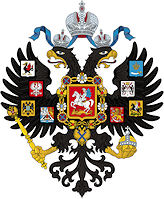
Nikolaus II. (Николай II, Николай Александрович Романов, 1868 - 1918) ist Zar von Russland.
Abb.: Nikolaus II. (Николай II, Николай Александрович Романов) als Ikone in einer Kirche im Kreml von Saraisk (Oblast Moskau), 2011 (!)
[Bildquelle: Santner / Wikipedia. -- Public domain]
1894-11-06

"Hier im Fernen Osten zeichnet sich die Mehrzahl der Europäer durch ihren Eigendünkel aus. Mit frevelhafter Geringschätzung sehen sie auf Chinesen und Siamesen herab. Ich habe gefunden, dass gerade die dümmsten und faulsten Europäer in dieser Beziehung ganz Besonderes leisten. Von den Chinesen kann man die Arbeitsamkeit lernen und von den Siamesen Ruhe in allen Lebenslagen. Diese hochmütigen Europäer sind als Kulturpioniere schwerlich von irgendwelchem Nutzen. Der Europäer ist kein höher stehendes Wesen als der noch nicht von der Kultur beleckte Naturmensch. Die Kultur, die wir unseren Vorfahren verdanken, kann kein Grund zur Verachtung unserer schwarzen und braunen Nebenmenschen sein. Energie, Gerechtigkeit und Milde müssen die Kulturfaktoren sein, nicht Willkür und Grausamkeit." [Quelle: Weiler, Luis <1863 - 1918>: Anfang der Eisenbahn in Thailand. -- Bangkok : Chalermnit, 1979. -- 282 S. : Ill. ; 19 cm. -- S. 78]
1894-11-12

Außenminister Prinz Devawongse Varopakar (สมเด็จพระเจ้าบรมวงศ์เธอ กรม พระยาเทวะวงศ์วโรปการ, 1858 - 1923) an den Gesandten Siams in Paris, Prinz Svasti Sobhana (สมเด็จพระเจ้าบรมวงศ์เธอ พระองค์เจ้าสวัสดิโสภณ กรมพระสวัสดิวัดนวิศิษฎ์, 1865 - 1935):
Abb.: Lage von Luang Prabang [ຫຼວງພະບາງ] am Mekong [ແມ່ນ້ຳຂອງ]
[Bildquelle: Edition 2-AMS, Series L9011. National Imagery and Mapping Agency, 1967. -- Public domain]
"Let the Siamese Minister in Paris go and make a strong protest against French authorities of Luang Prabang [ຫຼວງພະບາງ] sending Uparaj [อุปราช] to reside on the right bank of the Mekhong [ແມ່ນ້ຳຂອງ], and there behaving as master of the country, terrorizing and whipping chiefs of villages. Such political power assumed by French subject is not compatible with His Majesty’s sovereignty and is contrary to the Boundary Treaty with France of October 3. 1893, by which Mekhong River is the frontier between the two States. The necessary consequence of the treaty is that the chiefs of Luang Prabang have now no more authority on the right bank of the Mekhong than the Chiefs of Bassac [จำปาศักดิ์ / ຈໍາປາສັກ] and Nan [น่าน] on the right bank. We should have the right to take measures of police to stop such action. But we are persuaded .that it is due to excess of zeal of the French authorities. So we trust that the French Government will issue imperative instructions to withdraw the Uparaj." [Zitiert in: Manich Jumsai [มานิจ ชุมสาย] <1908 - 2009>: History of Laos. -- 2. rev., enl. ed. -- Bangkok : Chalermnit, 1971. -- 325 S. : Ill. ; 27 cm. -- Einbandtitel: A new history of Laos. -- S. 218]
1894-12
Es erscheint:
ดำรงราชานุภาพ <สมเด็จพระเจ้าบรมวงศ์เธอ กรมพระยา> [Damrong Rajanubhab] <1862 - 1943>: เรึ่องทุนกับแรง [Kapital und Arbeit]. -- In: วชิรญาณ [Wachirayan] ร.ศ. 113, 3 (1894-12). -- S. 238 - 263
"A perceptive description of the economic conditions of poor Thai urban workers, with international comparisons; discusses Chinese migration to Bangkok, secret societies, Western labour unions and social welfare issues." [Quelle: Breazeale, Kennon: The writings of Prince Damrong Rajanubhab : a chronology with annotations. -- Bangkok : Toyota Thailand Foundation : Foundation for the Promotion of Social Science and Humanities Textbooks Project, 2008. -- 60 S. ; 22 cm. -- ISBN 9789740697411. -- S. 17]
1894-12-13


"Frankreich und Siam sind noch nicht miteinander fertig. Im allgemeinen herrscht hier die Ansicht vor, selbst unter Engländern dass Siam dereinst in den französischen Kolonialsack gesteckt werden wird." [Quelle: Weiler, Luis <1863 - 1918>: Anfang der Eisenbahn in Thailand. -- Bangkok : Chalermnit, 1979. -- 282 S. : Ill. ; 19 cm. -- S. 79]
1894-12-18 - 1900-05-13

Raphaël Réau (1872 - 1928) ist im französischen diplomatischen Dienst in Siam. Briefe aus dieser Zeit sind veröffentlicht in:
Réau, Raphaël <1872 - 1928>: Jeune diplomate au Siam, 1894-1900 : lettres de mon grand-père Raphaël Réau / Philippe Marchat [1930 - ]. -- Paris : L'Harmattan, 2013. -- 246 S. : Ill. ; 24 cm. -- ISBN 978-2-336-29755-2
Abb.: Einbandtitel
1894-12-23
Prinz Damrong [ดำรงราชานุภาพ, 1862 -1943] wird der erste Innenminister. Ihm untersteht ganz Siam, das bisher zwischen dem Ministerium für den Norden [มหาดไทย - Mahatthai] und dem Ministerium für den Süden [กลาโหม - Kalhom] aufgeteilt war. Mahatthai [มหาดไทย] wird die Bezeichnung für das Innenministerium, Kalahom [กลาโหม] für das Verteidigungsministerium.
1894-12-24

Der deutsche Ministerresident Peter F. Kempermann (1845 - 1900) an Reichskanzler Chlodwig Carl Viktor Fürst zu Hohenlohe-Schillingsfürst, Prinz von Ratibor und von Corvey (1819 - 1901) über den belgischen Berater Gustave Henri Ange Hippolyte Rolin-Jaequemyns (1835 - 1902):
"Der deutsche Gesandte Kempermann hatte zunächst mehr als skeptisch reagiert, als Rolin-Jaequemyns ihm gegenüber im Dezember 1894 „radikale Veränderungen" angekündigt hatte. Er meinte, der Belgier werde kaum „etwas Brauchbares zu Stande bringen", und es würden „auf Seiten der Regierung weder der Eifer noch die Fähigkeit vorhanden sein, seine Entwürfe auszuführen." Kurze Zeit später wandte er sich vehement gegen Presseberichte, in denen von geplanten Reformen des Regierungssystems die Rede war und die Erwartung ausgesprochen wurde, „dass eine Regeneration Siams bevorstehe." Hierzu fehle Siam die „Kraft" und seinen Staatsmännern der „Willen"; zudem sei „Rolin Jacquemyns (sic), der als Doktrinär nach europäischen Mustern und Lehrbüchern arbeitet, ... außer Stande, zweckmäßige Reformen vorzuschlagen und ihre Durchführung in die Wege zu leiten." Ohnehin, schloss Kempermann, brauche Siam keineswegs Reformen, sondern Ruhe, Ordnung und Schutz der Bevölkerung und der Fremden vor Räubern." [Quelle: [Zitiert in: Petersson, Niels P.: Imperialismus und Modernisierung : Siam, China und die europäischen Mächte 1895 - 1914. -- München : Oldenbourg, 2000. -- 492 S. ; 25 cm. -- (Studien zur internationalen Geschichte ; Bd. 11). -- ISBN 3-486-56506-0. -- Zugl.: Hagen, Fernuniv., Diss., 1999. -- S. 110]
1894-12-25
Prinz Damrong [ดำรงราชานุภาพ, 1862 -1943] an Rama V.:
"One of my greatest difficulties is the finding of officials to send to administer the provinces because there is as yet no Civil Service School. I can only pick and pinch men from here and there and I am often guilty of violating your regulations. This is because the men I am looking for must possess several qualities. I must, first of all, be reasonably sure that they have the abilities for the jobs for which they are sent. Secondly, it is even more important that they should wholeheartedly go to do these jobs in the provinces."
[Quelle: Tej Bunnag [เตช บุนนาค] <1943 - >: The provincial administration of Siam from 1892 to 1915 : a study off the creation, the growth, the achievements, and the implications for modern Siam, of the ministry of the interior under prince Damrong Rachanuphap. -- Diss. Oxford : St. Anthonys College, Michaelmas Term 1968. -- 429 S., Schreibmaschinenschrift. -- S. 231f. -- Faire use]
ausführlich: http://www.payer.de/thailandchronik/ressourcen.htm
Phongpaichit, Pasuk <ผาสุก พงษ์ไพจิตร, 1946 - > ; Baker, Chris <1948 - >: Thailand : economy and politics. -- Selangor : Oxford Univ. Pr., 1995. -- 449 S. ; 23 cm. -- ISBN 983-56-0024-4. -- Beste Geschichte des modernen Thailand.
Ingram, James C.: Economic change in Thailand 1850 - 1870. -- Stanford : Stanford Univ. Pr., 1971. -- 352 S. ; 23 cm. -- "A new edition of Economic change in Thailand since 1850 with two new chapters on developments since 1950". -- Grundlegend.
Akira, Suehiro [末廣昭] <1951 - >: Capital accumulation in Thailand 1855 - 1985. -- Tokyo : Centre for East Asian Cultural Studies, ©1989. -- 427 S. ; 23 cm. -- ISBN 4896561058. -- Grundlegend.
Skinner, William <1925 - 2008>: Chinese society in Thailand : an analytical history. -- Ithaca, NY : Cornell Univ. Press, 1957. -- 459 S. ; 24 cm. -- Grundlegend.
Mitchell, B. R. (Brian R.): International historical statistics : Africa and Asia. -- London : Macmillan, 1982. -- 761 S. ; 28 cm. -- ISBN 0-333-3163-0
Kludas, Arnold <1929 - >: Die Seeschiffe des Norddeutschen Lloyd 1857 bis 1970. -- Augsburg : Bechtermünz, 1998. -- 165 + 168 S. : Ill ; 28 cm. -- ISB 3-86047-262-3. -- Standardwerk.
Ongsakul, Sarassawadee <สรัสวดี อ๋องสกุล>: History of Lan Na / translated by Chitraporn Tanratanakul. -- Chiang Mai : Silkworm, 2005. -- 328 S. : Ill. ; 23 cm. -- ISBN974-9575-84-9. -- Originaltitel: ประวัติศาสตร์ลัานนา (2001)
Barmé, Scot: Woman, man, Bangkok : love, sex, and popular culture in Thailand. -- Lanham : Rowman & Littlefield, 2002. -- 273 S. : Ill. ; 24 cm. -- ISBN 0-7425-0157-4
Van Beek, Steve <1944 - >: Bangkok, then and now. -- 2. ed. -- Nonthaburi : AB Publications, 2001. -- 131 S. : Ill. 22 x 29 cm. -- ISBN: 974-87616-0-6
ศกดา ศิริพันธุ์ = Sakda Siripant: พระบาทสมเด็จพระจุลจอมเกล้าเจ้าอยู่หัว พระบิดาแห่งการถ่ายภาพไทย = H.M. King Chulalongkorn : the father of Thai photography. -- กรุงเทพๆ : ด่านสุทธา, 2555 = 2012. -- 354 S. : Ill. ; 30 cm. -- ISBN 978-616-305-569-9